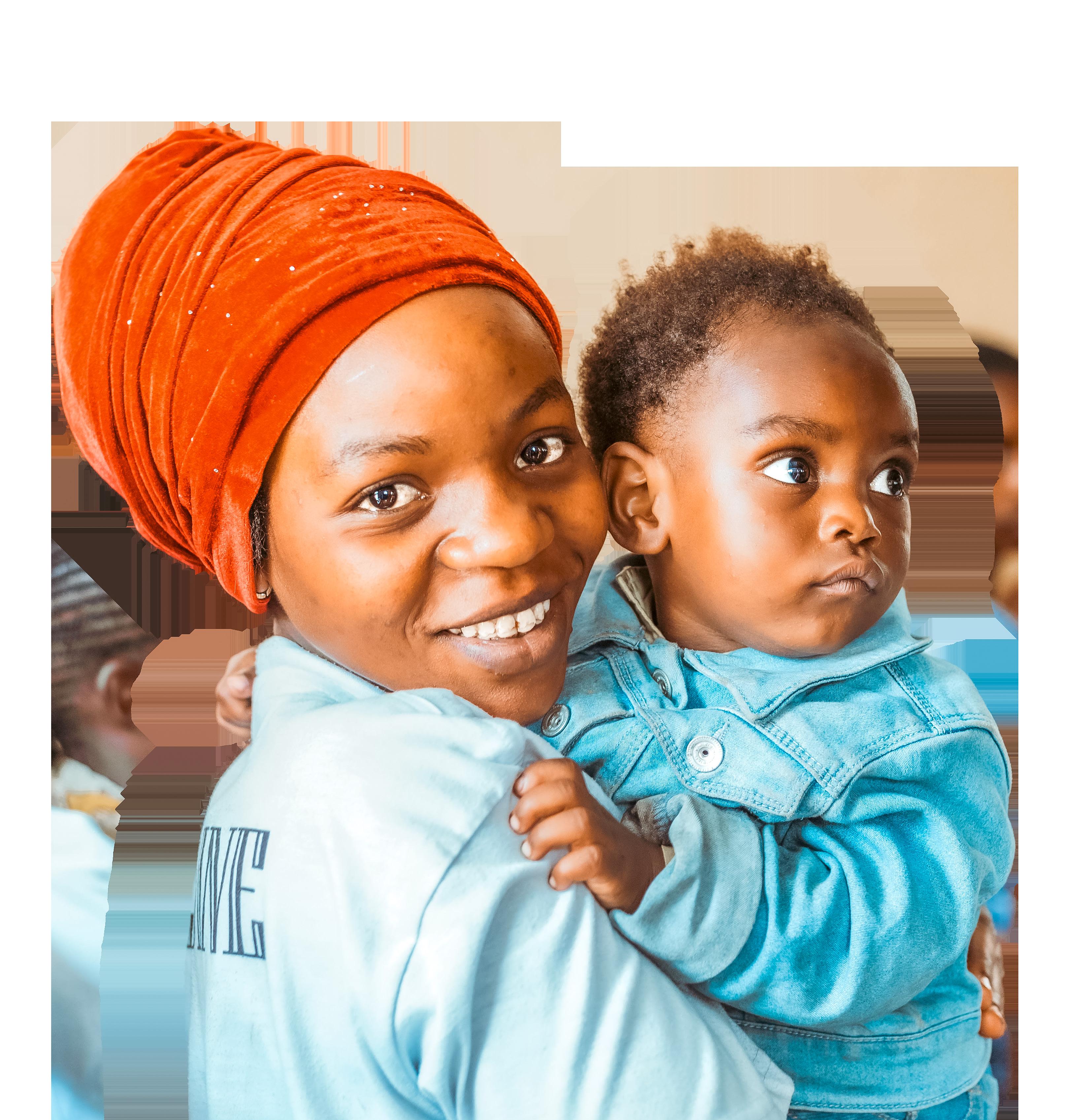FAITH IN THE FIRE
The church's response to crisis and displacement in the Democratic Republic
A CHURCH WITHOUT WALLS
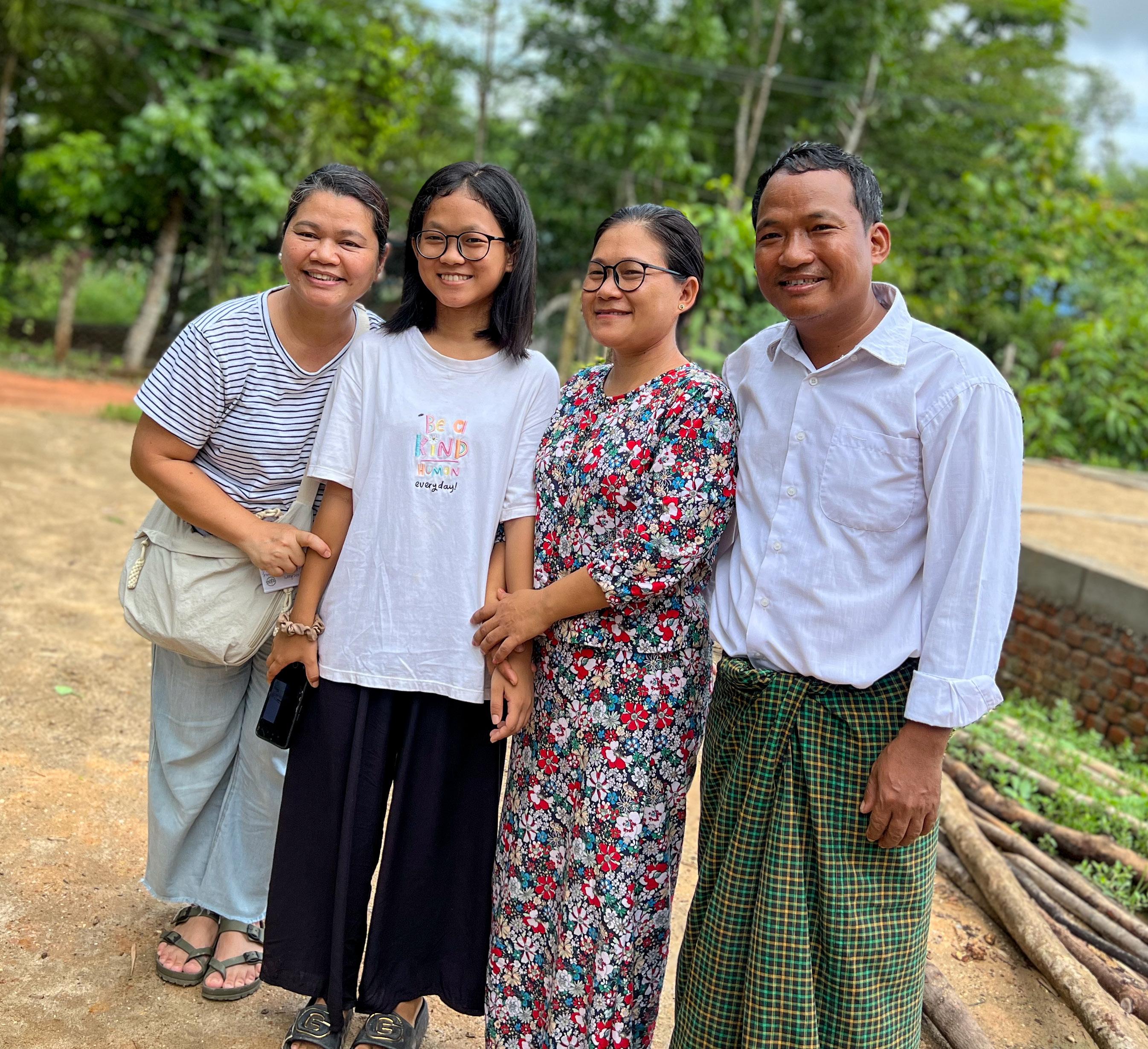
FAITH THAT DOES NOT FALTER
How the Church of the Nazarene in Myanmar stands in hopeful opposition to war, disaster, and displacement


The church's response to crisis and displacement in the Democratic Republic

How the Church of the Nazarene in Myanmar stands in hopeful opposition to war, disaster, and displacement


NCM Magazine aims to tell stories of the church living out Christ's compassion. Our hope is that all of us would hear the call to compassion as a lifestyle.
Following the example of Jesus, Nazarene Compassionate Ministries partners with local congregations around the world to clothe, shelter, feed, heal, educate, and live in solidarity with those who suffer under oppression, injustice, violence, poverty, hunger, and disease. NCM exists in and through the Church of the Nazarene to proclaim the gospel to all people in word and deed.
NAZARENE COMPASSIONATE MINISTRIES 17001 Prairie Star Pkwy, Lenexa, KS 66220 (800) 310-6362, info@ncm.org
MAGAZINE DESIGN: Prelude FOR A FREE SUBSCRIPTION visit ncm.org/magazine
COVER PHOTO: Brandon Sipes
SUBSCRIPTION CHANGES email info@ncm.org or write to NCM Magazine, 17001 Prairie Star Pkwy, Lenexa, KS 66220
QUESTIONS? COMMENTS? email info@ncm.org
In Armenia, the local Kids Club has been a place of growth, support, and faith since 2004.
In the heart of Africa, the eastern provinces of the Democratic Republic of Congo have been gripped by a humanitarian crisis of staggering proportions.
How the Church of the Nazarene in Myanmar stands in hopeful opposition to war, disaster, and displacement.
In Ulaanbaatar, where winter temperatures can plummet to -40°C, a different kind of church gathers, one not defined by its architecture but by its warmth, compassion, and open doors.

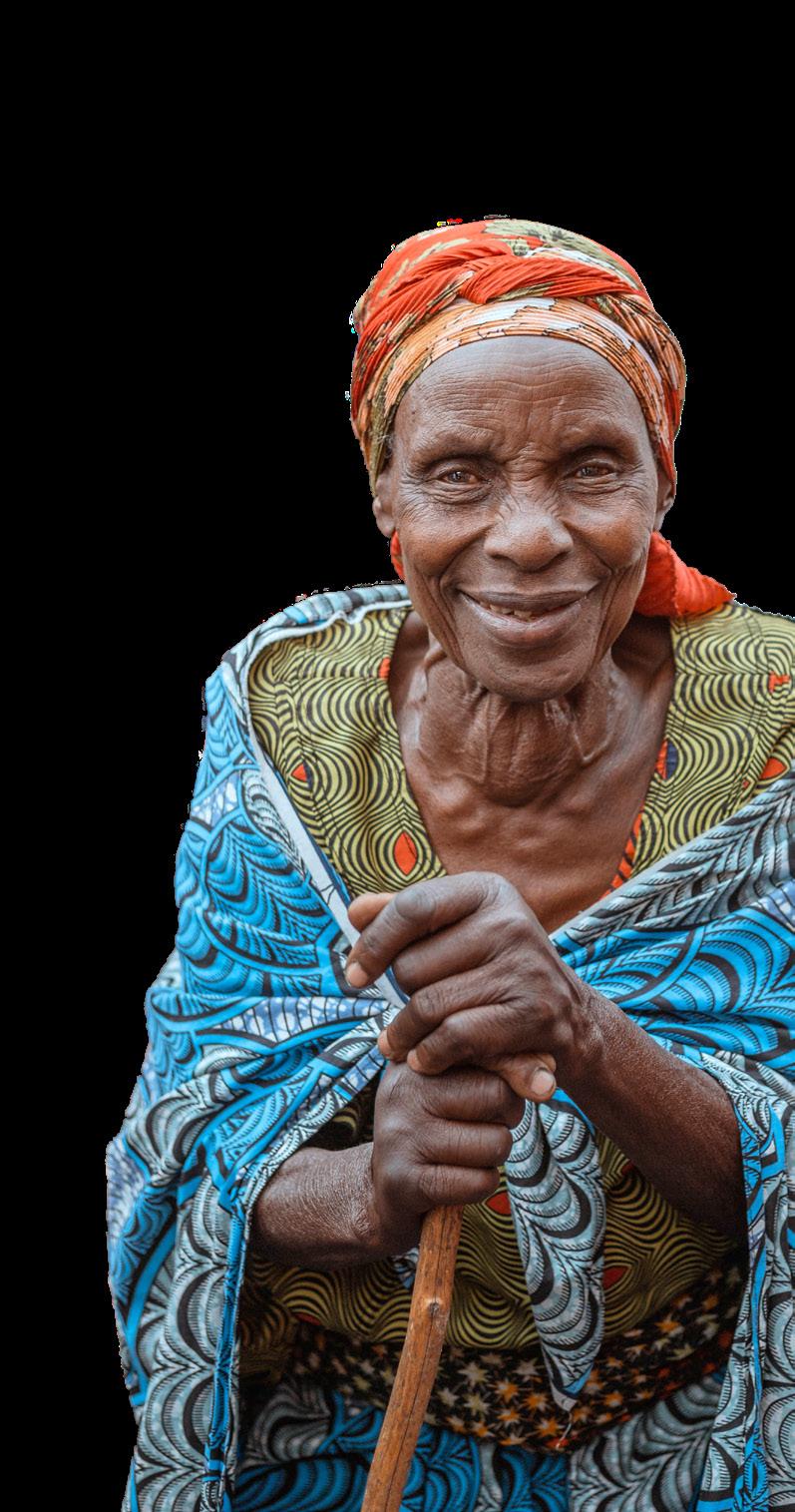
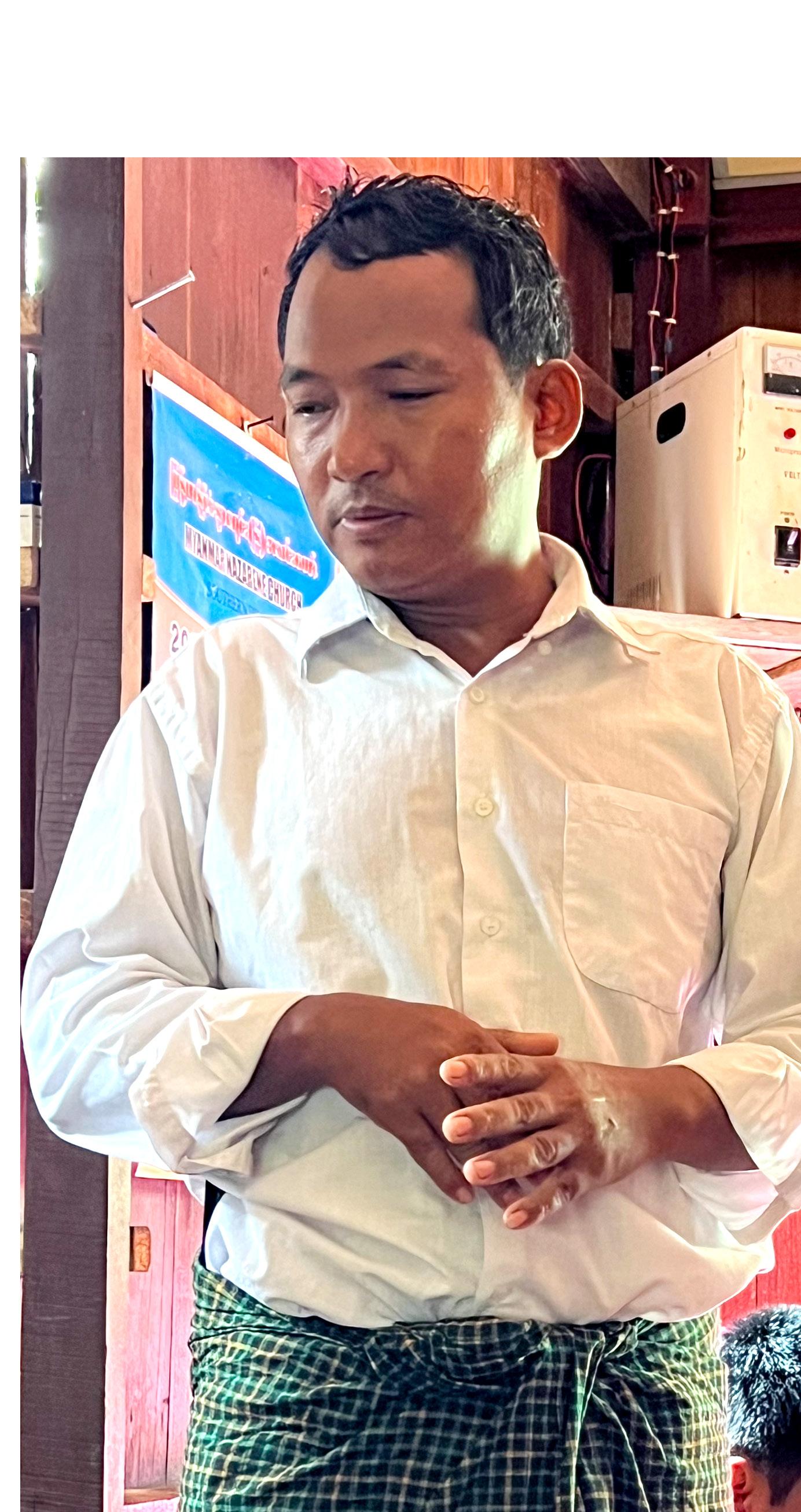


“ But seek the welfare of the city where I have sent you into exile, and pray to the Lord on its behalf, for in its welfare you will find your welfare.”
- Jeremiah 29:7
“For I know the plans I have for you,” declares the LORD, “plans to prosper you and not to harm you, plans to give you hope and a future.”
- Jeremiah 29:11

God’s plans extend beyond what we can imagine, realize, or hope for. In this sense, trying to understand God’s way in the world feels like a mystery, even an impossibility. Yet embracing God’s plans is what it means to have faith in God’s transformation of our world. We face an impossible task, made possible in Christ. Even when faithful actions seem senseless by the world’s standards, we are still called to put our trust in God.
The prophet Jeremiah also calls for a higher vision. Rather than rebuilding only their own nation, Israel is urged to reach out to their neighbors and seek peace and welfare with those who were not God’s people.
This issue of the NCM magazine highlights Christians who embody this vision in situations of fear, war, and desperation. Their stories do not feature saints set apart from the rest of us, but ordinary people scattered across the globe who bring light into difficult places. Here we see the church as it is called to be—people whose faith in Jesus ushers them into a new way of living. Walter Brueggemann writes that embracing God’s vision makes us “children of the eighth day”—followers of Jesus who choose a radical, alternative way of life.
Too often, fear and scarcity tempt us to shrink God’s vision and live small. God calls us not to be paralyzed, but to live by a different rule. The stories in these pages remind us that even in fearful times, the church learns to serve and love. When resources are scarce, believers gather to share with neighbors. In Armenia, Cameroon, DR Congo, Italy, Iraq, Mongolia, Myanmar, and Ukraine, Christians make space for others even in the midst of war because Jesus asks it of them. They may be afraid, but they are not prisoners to fear. They keep serving, confident in God’s abundant love and care.
The use of “peace and welfare” in Jeremiah 29 is no accident. This peace—shalom—is fullness of life in God’s vision for the world. Jeremiah’s words are not a promise to keep God’s people safe, but an invitation into God’s renewing work. Living into this vision requires faith, because it stretches beyond our present circumstances. The church is called to embody God’s reign, an alternative to the kingdoms, powers, and principalities of this world—an alternative to fear, despair, poverty, selfishness, and loneliness.
Brueggemann writes:
“Shalom is rooted in a theology of hope, in the powerful, buoyant conviction that the world can and will be transformed and renewed, that life can and will be changed and newness can and will come.”

This vision takes shape every week as congregations around the world pause in thankfulness at the Lord’s Supper. We are formed as the Body of Christ through Word and table. The way of Jesus resists the logic of this world: we forgive and seek reconciliation, we help those who don’t “deserve” it, we visit the imprisoned, we feed the hungry (Luke 4:16–21). We join God’s new creation, where wolves and lambs lie down together (Isaiah 11:6) and swords become plowshares (Isaiah 2:4). These are God’s plans for us: a new reality under Christ’s lordship. Lord, give us eyes to see and faith to live into “your kingdom come on earth as it is in heaven.”

Nell Becker Sweeden, Director of NCM
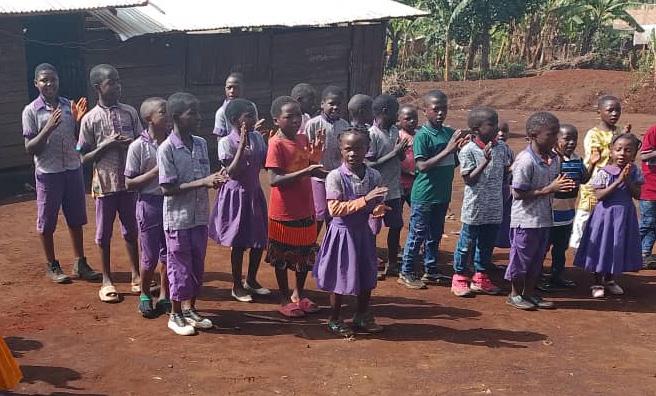
By Simbarashe Kanenungo, Holistic Child Development Coordinator
The Church of the Nazarene is a new but growing presence in Cameroon. In response to the country’s persistent economic hardships—which have severely affected the well-being of children—the church has stepped forward with a holistic outreach approach aimed at ministering to vulnerable youth.
Cameroon has been grappling with a severe economic crisis since 2018. This has largely been driven by the conflict in the Southwest and Northwest regions and the lingering effects of the COVID-19 pandemic. Many children are left to fend for themselves, roaming the streets, often exploited to sell food or subjected to sexual abuse. Education remains out of reach for many, especially orphans, displaced families, and those rejected by society.
Recognizing that children hold a vital place in God's kingdom, the Church of the Nazarene responded to this crisis by establishing a school in the town of Galim.
The École Primaire Bilingue de Galim Child Development Center offers vulnerable children a chance at education and a better future. With 72 students enrolled from grades one through
seven, the school is supported by seven committed volunteers, including both teachers and cooks, who faithfully minister to the children each week.
In May, the school held a celebration honouring students who completed their first year of kindergarten, awarding certificates to mark their achievements. One mother shared her heartfelt gratitude. “Even when school is over, this program continues to bless our children,” she explained. “My son now prays at home before meals.”
Beyond education, the ministry is fostering spiritual growth. Children are not only participating in Bible studies, homework assistance, sports, and games—they’re also attending church with their families, enriching the local congregation.
The local team has engaged in training led by the holistic child development coordinator to enhance its capacity for effective ministry. Since receiving support from Nazarene Compassionate Ministries beginning in March 2025, the school has made remarkable progress and is now officially registered with the Ministry of Education.


By Krystle Bowen
The weight of the world’s pain can feel crushing—disasters, conflicts, and struggles surround us daily. In the middle of it all, God does not ask us to turn away but to walk in compassion. Through Scripture, we learn to see with open eyes, respond with love, and practice mercy faithfully.
Suffering is nothing new, but today we are more aware than ever. A notification buzzes, and we know instantly when disaster strikes. News and social media bring stories of war, famine, and crisis worldwide into our homes within seconds. Closer to us, communities wrestle with housing issues, broken systems, and mental health struggles. Even within our own families, we feel the weight of illness, conflict, and loss. At times, we wish for a pause button—just a moment to catch our breath.
But there is no pause. As followers of Jesus, we are called to be the hands and feet of Christ, moving toward suffering rather than away from it. The question, then, is how do we live this out when the needs around us feel so overwhelming?
Ask God to open your eyes to someone’s need (Luke 10:25-37).
In the parable of the Good Samaritan, the first “good” thing the Samaritan does is notice. Others walk past, too busy or afraid to acknowledge the suffering before them. The Samaritan does not have to travel far; he simply opens his eyes to someone on his path.
Who is on your path? Who needs your compassion—in your family, your neighborhood, your city? If you don’t yet see, get closer. Proximity matters. Volunteer at a local school, food pantry, or foster care program. Small acts— listening, meeting a need, spending time—can reap eternal investments.
Choose presence over avoidance
The Samaritan acted on what he noticed. He cared for the hurting man. Noticing is the beginning, but not the end. Like Jesus, we must be willing to step in even when it’s uncomfortable. When Jesus came, he brought the Kingdom of God—a promise of peace both present and yet to come. As disciples, we point people to this reality: God has come and is still coming. Every shared meal, every visit to the lonely, every pursuit of compassion gives us a glimpse of that kingdom breaking in.
(Micah 6:8)
Compassion is more than a single act; it is a posture of the heart. Through prayer and Scripture, we are formed into people who notice. The Spirit strengthens us to move, and when we are overwhelmed, emboldens us to practice mercy again and again. Compassion is not about fixing everything. It is about being faithful with what God has placed right in front of you. Notice, move,
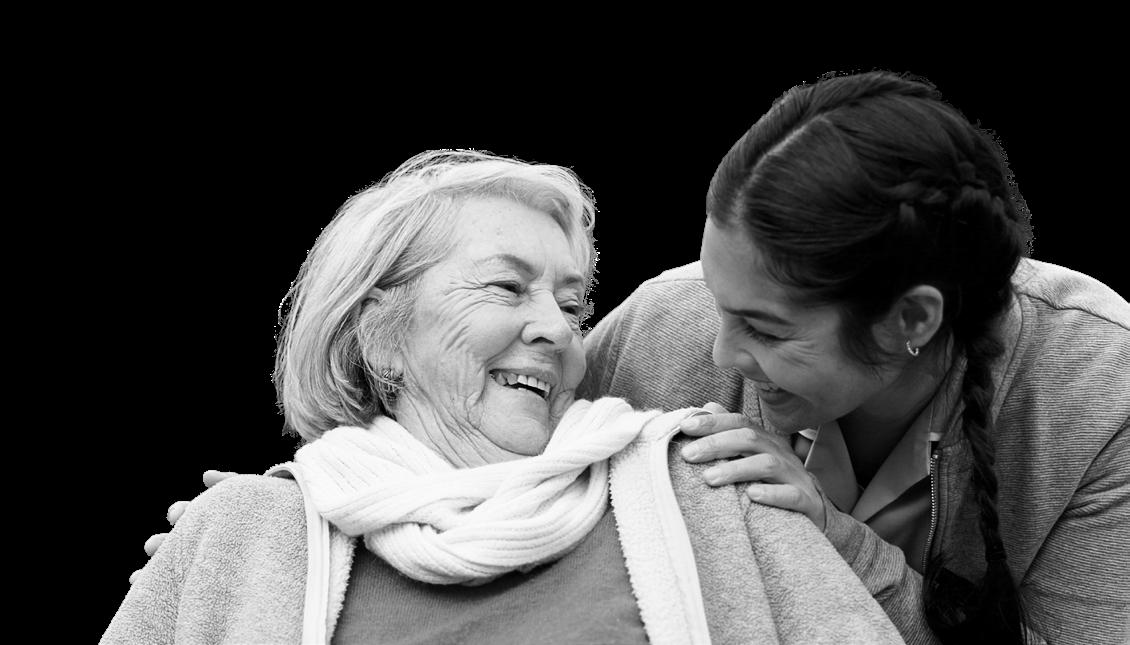


“It means holding firmly to [God’s] teachings and example, even when fear, anger, and hatred seem natural. It means choosing forgiveness over revenge, showing compassion to those who suffer — even those on the other side — and praying for enemies instead of wishing them harm. It is trusting God’s promises when the future is uncertain, and finding peace in [God] when everything around us feels unstable. It also means encouraging and supporting others, especially fellow believers, by sharing the hope we have in Christ.”
- Ram Tin Par, NCM Coordinator
“First of all, through prayer. We are not the ones who make the seed grow — we are simply sowing, tending, and watering it — but it is the Holy Spirit who brings growth. Prayer is the essence of everything. Along with prayer, we must share God’s Word. We must also be a model. They should see their leaders not only in the church but also outside — in our families, in the way we interact with others, and in how we show God’s love and light in every part of life and in our communities. It is also essential to walk alongside them in their journey. Every life is a life God has entrusted to us. That’s why we walk with them even when they give up on themselves or believe they are unworthy. In those moments, we need to be the ones to remind them that they are worthy, that Jesus was crucified for them, and that their life has purpose and value. Finally, create opportunities for them to serve. Give young people space to use their talents not only within the church but also in the community. Involve them in service projects and outreach where they can share God’s love with those who don’t yet know Jesus."
- Lusine Melkonyan, Eurasia North Field NCM Coordinator

By Lusine Melkonyan, Eurasia North Field NCM Coordinator
In Armenia, the local Kids Club has been a place of growth, support, and faith since 2004. The program meets in the church building each week and serves 45 children between the ages of 6 and 18, reaching a total of 70 families—225 people in the community. More than just an after-school gathering, the Kids Club provides clothing, school supplies, hygiene items, food, and even medical support to children and their families. Camps, home visits, and a variety of weekly activities nurture children’s spiritual, intellectual, physical, emotional, and social development.
In a community facing economic hardship and ongoing emigration, a place like Kids Club is essential. It offers stability, teaches children about God’s love, and helps them grow into confident, capable young people who can positively impact their surroundings. Over the years, the seeds planted in these children’s lives have borne remarkable fruit—many who once attended the Kids Club have now graduated and serve faithfully in the church and in the center itself. They are leading Bible lessons, helping with events, and caring for the next generation, continuing the cycle of love, faith, and service that shaped their own lives. Below are personal stories of individuals from their experiences at the program, highlighting the long-term impact these centers are making.

Q: What ages did you attend the school?
I started attending our Kids Club when I was very young. I don’t remember exactly
how old I was—maybe around 7 or 8 years old— because it feels like I’ve known it forever.
Q: What’s your favorite memory from school?
Liana: One special day was all about Spain, and our pastor Trino made delicious spaghetti with sauce. I still remember that amazing taste—it was the best I had ever tried! We also had these awesome camps, and I truly cherish every memory from those days. Another great memory is worship classes in a small apartment—it was so much fun, and we still sing that song together in our Kids club.
Q: Who was the most impactful person for you at school?
Liana: I don’t really have just one leader who influenced me the most. Instead, every leader I’ve had has left a special impact on me. From each of them, I’ve learned something valuable and taken the best parts of their example. What stands out to me the most is that I saw Jesus reflected in all of them—their kindness, patience, and love showed me what it truly means to follow him. Their example has inspired me to grow in my faith and to serve others with the same heart.
Q: How did the school impact your faith?
Liana: That place truly shaped who I am. I honestly can’t imagine my life if I hadn’t gone there. That’s



where I first learned about Jesus and experienced his love firsthand. I saw how close he really is and discovered a way to communicate with him personally. I understood that he’s not far away but right here with me. That experience didn’t just shape my faith—it shaped me as a person.
Q: How did the school prepare you for serving?
Liana: This place showed me what it truly means to serve and how to reflect Jesus in every step I take. As I grew up here, I not only learned what serving children looks like, but I also experienced it firsthand. I saw many examples—some were wonderful, and others were things I didn’t like as a child. Now, as a grown-up, I avoid thinking about those things I disliked and focus on what’s positive and meaningful.
Q: Where or how do you serve now?
Liana: I serve in the kids’ ministry, which is really close to my heart. I love working with the children and helping them grow. Besides that, I also assist during Sunday services and help out with the media team. Sometimes, as needed, I step in to support other ministries as well—but working with kids will always be my favorite.
Q: Why do you serve?
Liana: I serve to grow closer to Jesus and deepen my faith. I truly believe that those who serve are blessed even more than those they serve. Through my involvement in ministry, I see myself growing in faith and taking important steps in my spiritual journey. Serving also gives me the opportunity to share God’s love, show who he is, and help others know him better—because that’s what he has called us to do.
“It’s not just a place—it’s family.”
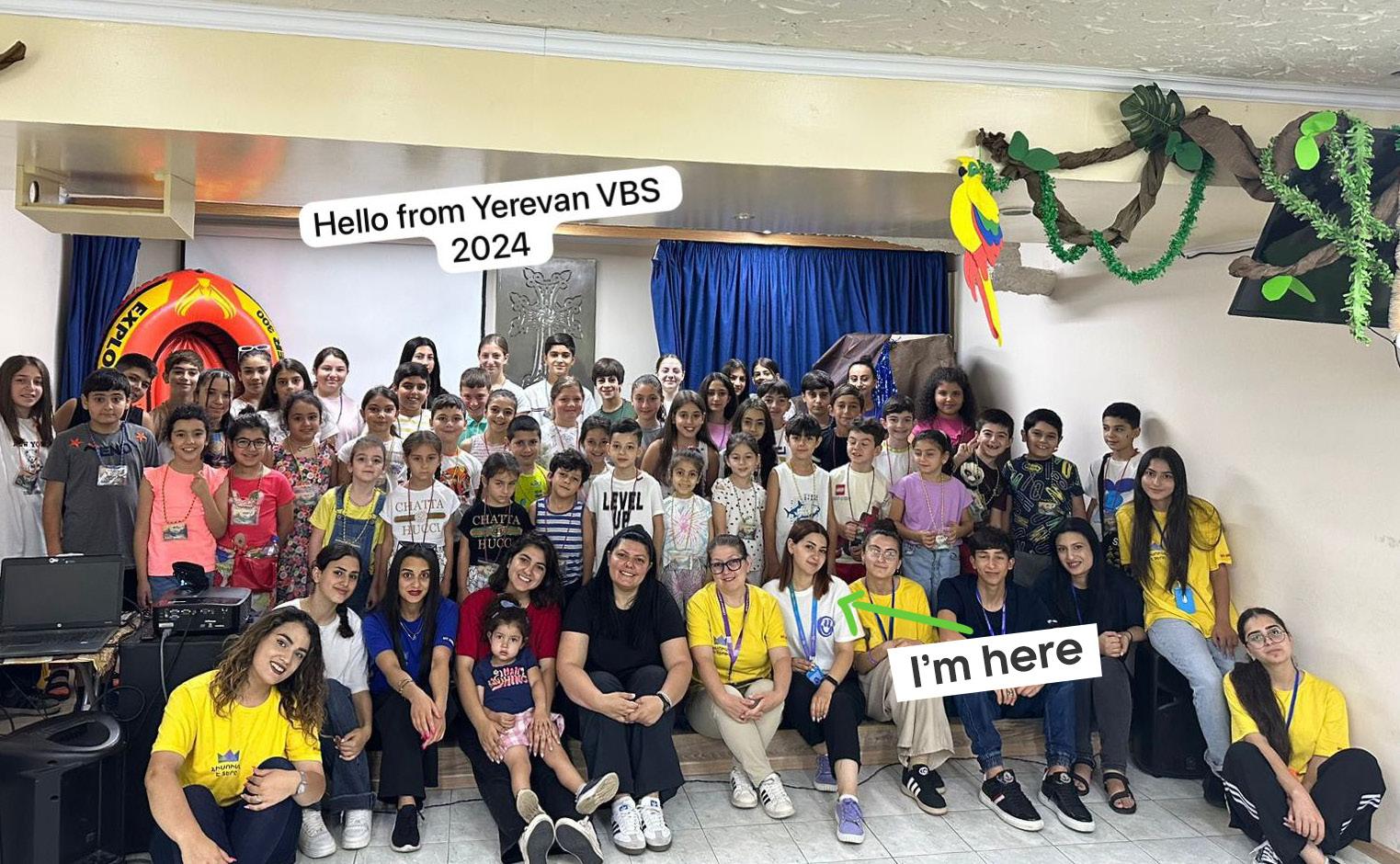
Q: What ages did you attend the school?
Manvel: I think I was around 6 when I started attending the Child Development Center (CDC), and I finished it at 18.


Q: What’s your favorite memory from school?
Manvel: My favorite memories are from short time camps during Christmas time. We were having fun together and also growing in knowledge and faith.
Q: Who was the most impactful person for you at the school?
Manvel: It was always my leaders, who were ready to answer my questions, support me, and pray for me.
Q: How did the school impact your faith?
Manvel: The center had a really big impact on my faith, with its Bible studies, worship times, and spiritual discipline that helped my faith grow.
Q: How did the school prepare you for serving?
Manvel: Having chances to serve during my time at the center was important for me so I could share my experience with my leaders and get advice to become better at it. I also will say that God did a lot of work in me so I would become more Christlike.
Q: Where or how do you serve now?
Manvel: I’ve had experience serving in kids ministry, but now I serve with my church’s media team and help my pastor when he needs me.

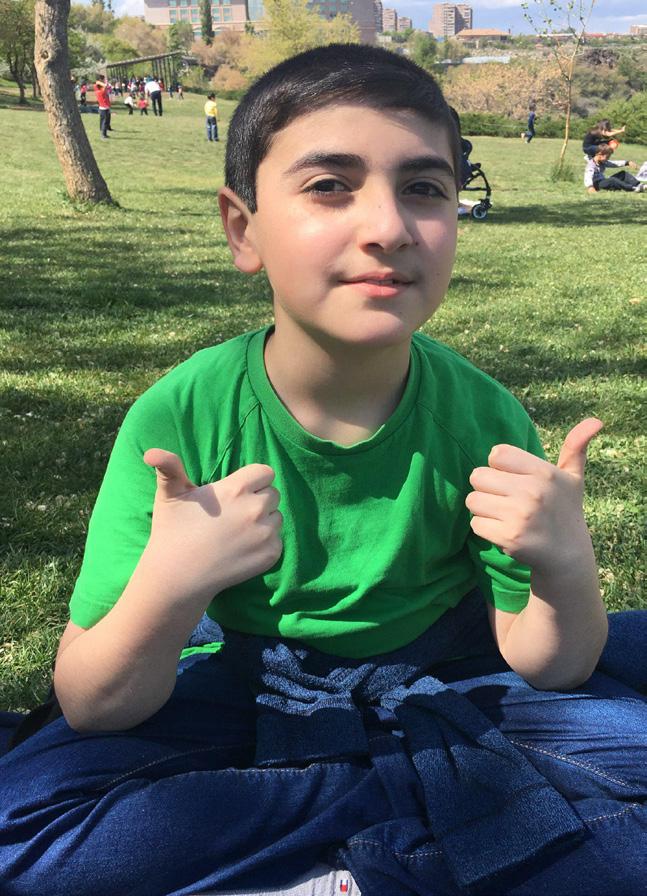
“It was always my leaders who supported and prayed for me.”
Q: Why do you serve?
Manvel: Having a chance to serve is a blessing from God because you become part of his work. This thought keeps me serving at times when my faith is not at its best.
Q: Is there anything else about the church, serving, or the schools that you’d like to share?
Manvel: It is hard work, so I want to thank everyone who served me, helped me, encouraged me, and prayed for me. I’m also really grateful to God, who blessed me with the school.
Q: What ages did you attend the school?
Mariam: I was 7–8 years old when I attended Kids Club for the first time.
Q: What’s your favorite memory from school?
Mariam: One day in a Bible lesson, one of our leaders, Miss Lucine, told us the story of a paralyzed man, and I was impressed by Jesus’ kindness and the willingness of the paralyzed man’s friends to help their friend at any cost. I went home and told this story to all my friends, both on the street and at school. Another memory I’ll never forget—when I received letters from my sponsor, I was so happy. At first, my leaders translated them for me, and later I felt proud when I could read them on my own. One letter even had beautiful stickers that I used to decorate my bed.
Q: Who was the most impactful person for you at school?
Mariam: Mrs. Anna, one of the leaders, is the person who influenced me the most. We held
camps every year, and at one of those camps with the theme “Jesus is my friend,” I accepted the Lord into my life thanks to the leaders of the church. Their example has continued to impact my faith.
Q: How did the school impact your faith?
Mariam: I felt the endless love of the Lord when I was a child here, and that shaped my faith. I stayed in church through the teen and youth groups, and I’ve remained in the Lord to this day.
Q: How did the school prepare you for serving?
Mariam: I remember my first act of service was at a backyard camp. I had a small group and was scared, but my leaders were always by my side to help with everything. Even after the program ended, I received a blue notebook with white flowers as a gift—it became my first prayer journal.
Q: Where or how do you serve now?
Mariam: I serve in Kids Club as a small group leader, also in the teen group and Sunday school.
Q: Why do you serve?
Mariam: Ministry is a way to be an instrument of the Lord, which is very important to me. Of all my ministries, I like the Kids Club ministry the most, because when I was that age I felt the endless love of the Lord. And by serving, I try to make children feel the love that I once felt.
“Ministry is a way to be an instrument of the Lord.”
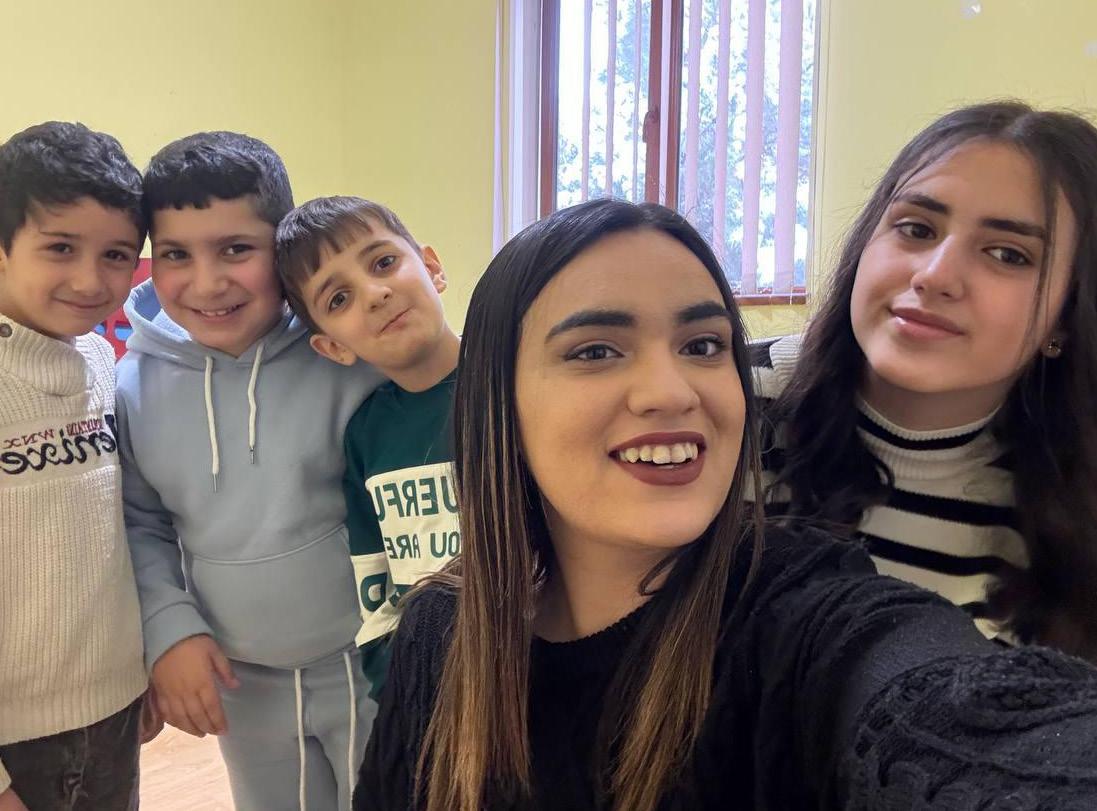





HOW THE CHURCH STANDS AMID WAR IN THE DEMOCRATIC REPUBLIC OF CONGO

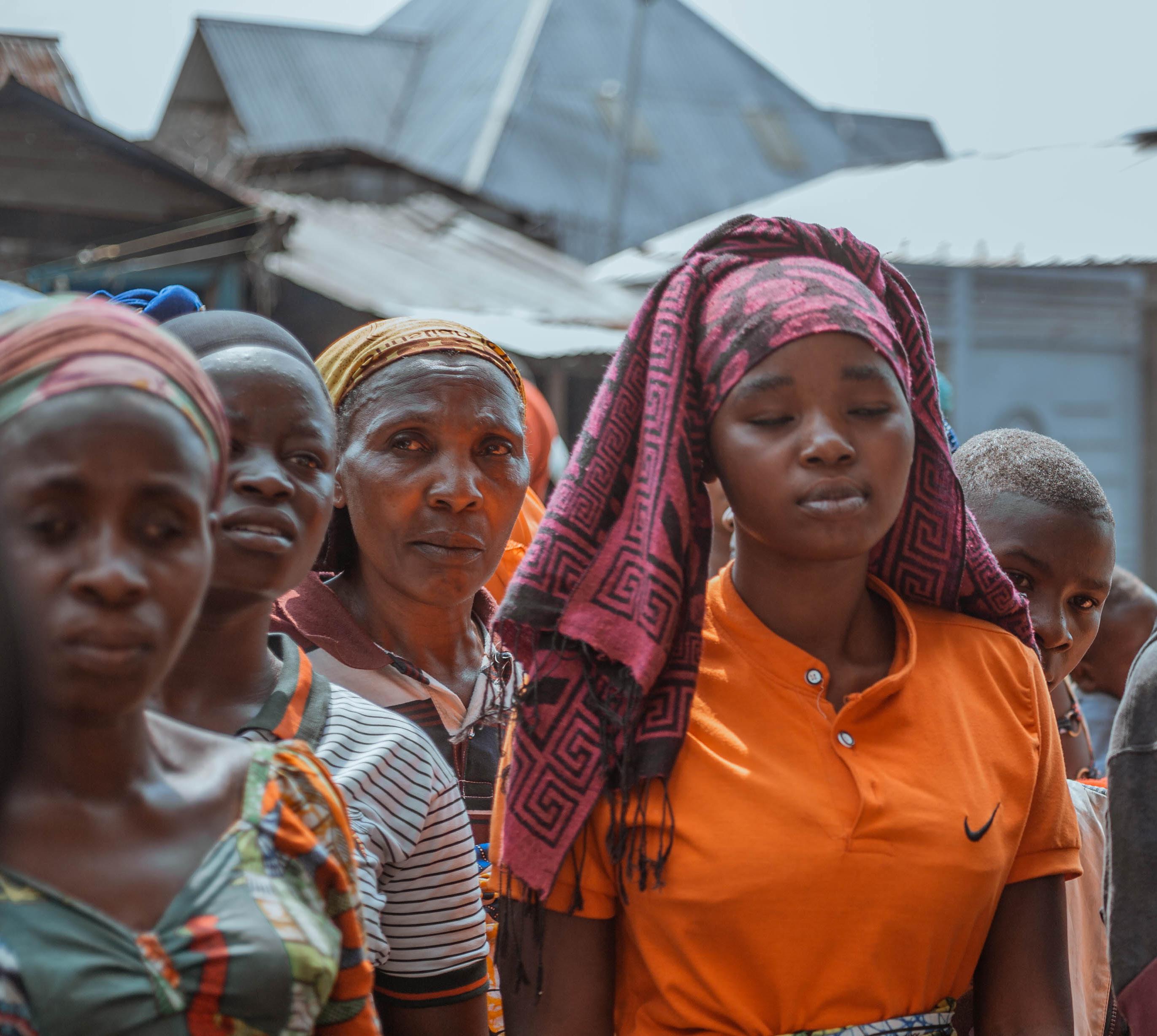
By Pascal Balibanga, Africa Central Field NCM Coordinator & Lyne Mendy, Regional Disaster Response and Humanitarian Crisis Advisor
In the heart of Africa, the eastern provinces of the Democratic Republic of Congo have been gripped by a humanitarian crisis of staggering proportions. Since early 2025, relentless conflict, armed robberies, mass displacement, and widespread violations of human rights have torn through communities, particularly in North and South Kivu, leaving devastation in their wake.
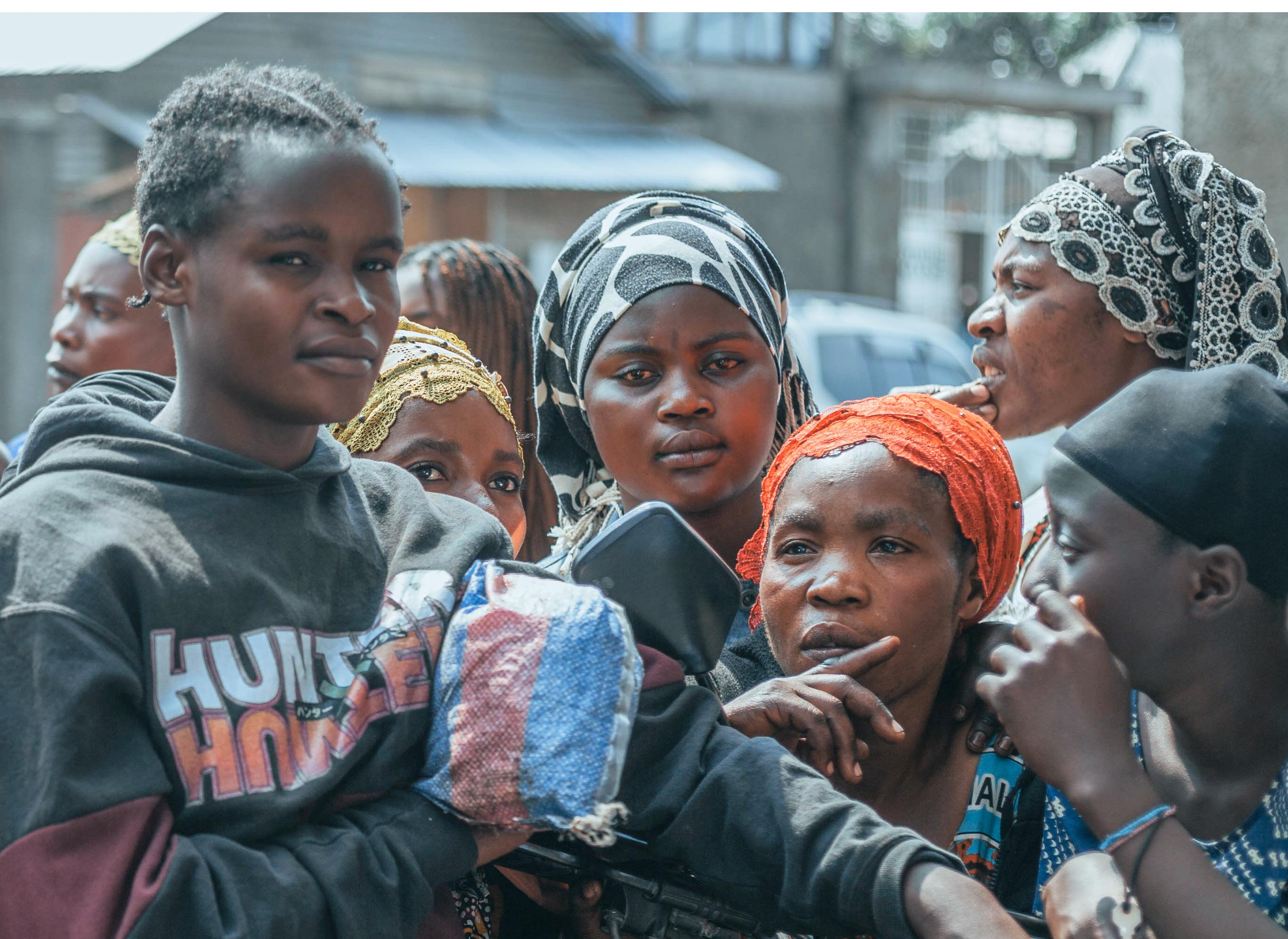

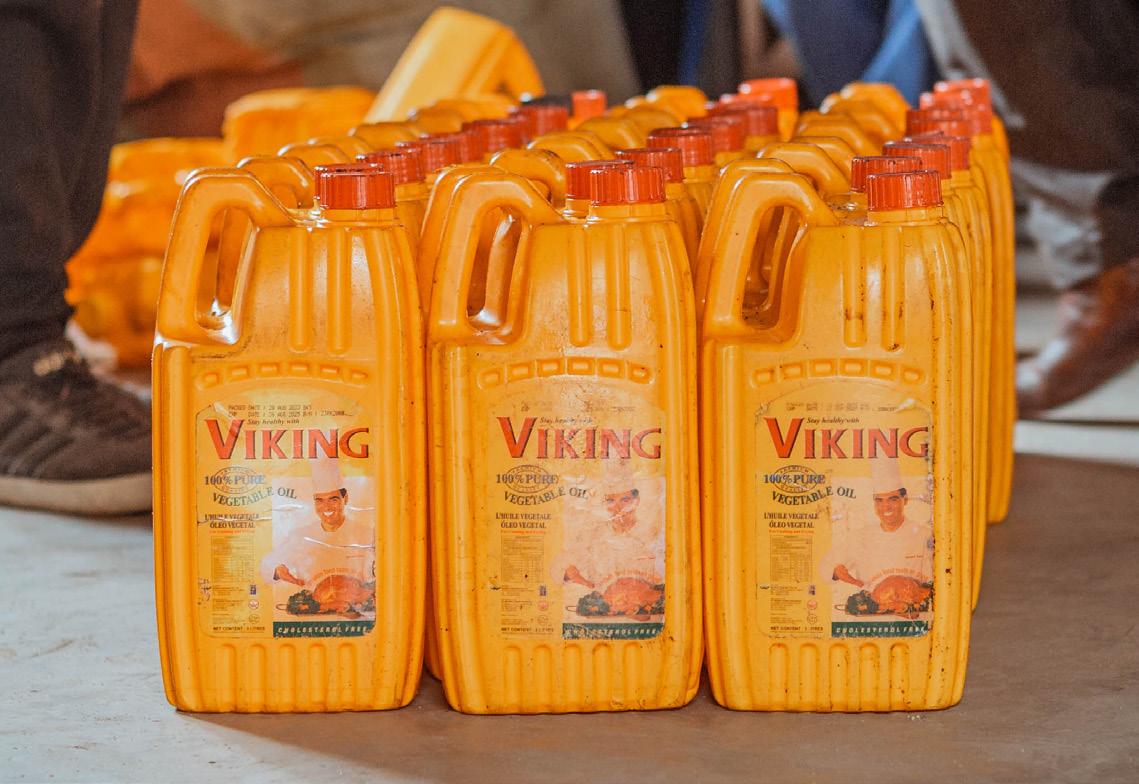
The cities of Goma and Bukavu are now under the control of rebels, creating a climate of fear, insecurity, and growing desperation. In Goma’s Karisimbi community, armed bandits have targeted homes and businesses. In areas like Katoyi and Katindo, the violence is so constant that the sound of gunfire has become a normal feature. Entire neighborhoods have emptied out as families seek safety across borders or in displacement sites. "We don’t know how fast things are changing or where to turn for help," shared one local pastor.
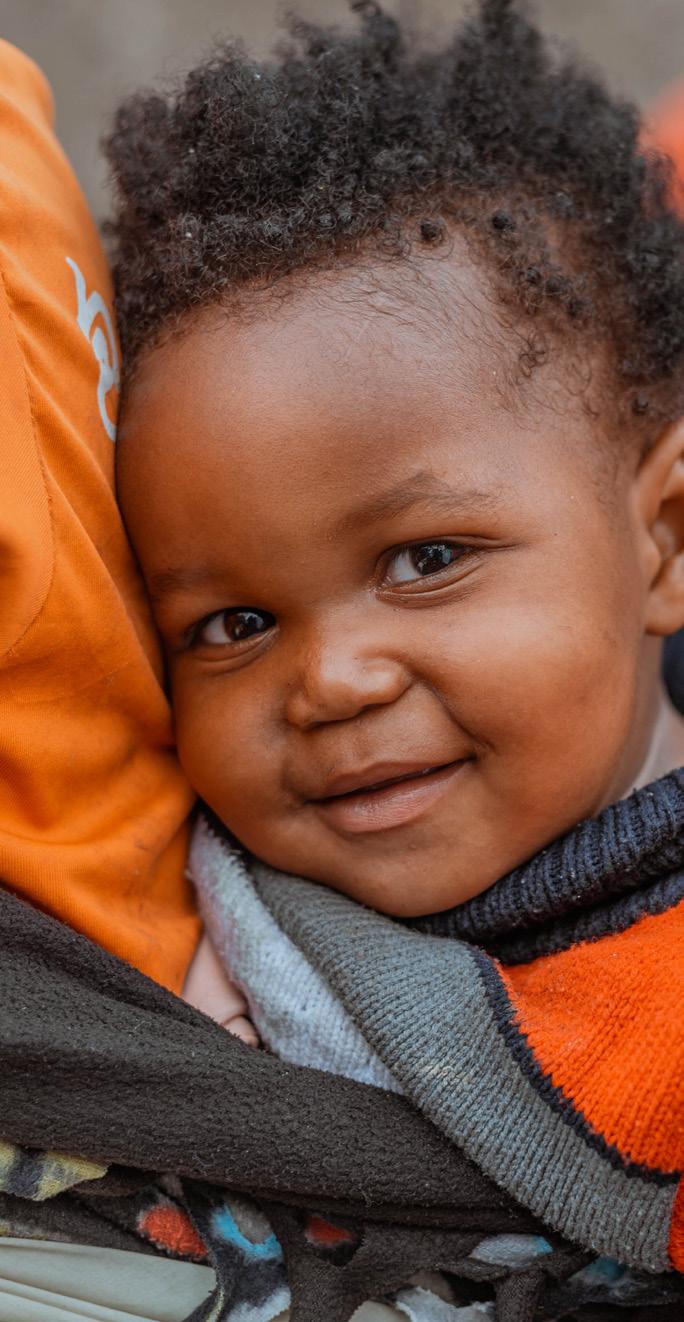
The conflict has had a profound impact on the Church of the Nazarene, particularly in the Virunga, North Kivu, Central, and South Kivu Tanganyika districts. In some cases, congregants were forced to flee overnight, abandoning homes, farms, and livelihoods. The sound of gunfire has echoed around the Eden Francophone Church, which sits in the heart of Goma’s conflict zone.
With banks shut down and mobile money agents charging exorbitant fees, even basic economic transactions became impossible. Families had no access to cash. Food prices soared. And still, the church remained, standing in solidarity with its members, even as buildings emptied and villages were overrun.
By late January 2025, after rebels destroyed displacement camps, thousands of families were once again on the move. Some returned to unsafe home villages, while others crossed into Burundi, Rwanda, Kenya, and Tanzania; a few fled to Kinshasa. The displacement left families in extreme poverty, lacking everything from shelter to clothing to medicine.
Church leaders, including pastors and missionaries, have endured threats, persecution, and displacement, often without access to basic resources. Health facilities are overwhelmed and understocked. Many people are traumatized, especially women and children, after surviving direct attacks or losing loved ones. Christian communities have been deeply shaken, with spiritual life interrupted and places of worship emptied.
When conflict escalated in January 2025, thousands of families in Eastern Democratic Republic of the Congo were forced to flee their homes with little warning and few belongings. In the following days, the Church of the Nazarene responded quickly, led by local pastors and volunteers who refused to abandon their communities in crisis.
In partnership with Nazarene Compassionate Ministries, local churches began delivering food staples like rice, beans, maize flour, oil, and salt— basic ingredients that helped families prepare their first hot meal in days. Families received blankets, mattresses, tarps, pots, and clothing alongside food. Special protection kits were delivered to mothers with newborns, providing critical support in highly vulnerable conditions.
“My child and I went days without food and slept in terrible conditions,” explained Natalie, a new mother forced to flee her home. “Today, we received two weeks of food and a protection kit. We are so thankful to God and the Church of the Nazarene.”
As the situation began to stabilize, local leaders understood that short-term aid would not be enough.
People longed to return home but found their communities in ruins and their livelihoods destroyed.
In response, churches worked with NCM to launch social reintegration programs across the
“We didn’t expect this help. So many people living with disabilities have been overlooked. Your support, rice, mattresses, sugar, bring us real relief. May God bless you for remembering us.”
most impacted areas. In the Virunga district, 600 individuals received farming tools, seeds, and financial literacy training, along with small cash grants to help launch businesses. In South Kivu, 500 families were supported with food, hygiene items, and basic supplies to begin rebuilding. In North Kivu, 1,800 people received reintegration assistance.
“We were wondering how to return to our villages,” said Mr. Nzabonimpa of Virunga. “Now, with tools, seeds, and financial training, we can farm again and start small businesses.”
After their communities were destroyed, many did not have the resources to begin rebuilding. Without tools or intact farmland, recovery seemed impossible. However, with consistent support from the church, families are slowly restoring what was lost.
Rafiki Bazira, a mother of five from Tongo district, fled to Rusayo with her children. “We arrived in Rusayo with nothing,” she said. “Thanks to the food, blankets, and cooking supplies, we were able to survive.”
Support is also extended to people who are often overlooked during crises. Mr. Roxy, a leader within a local disability association, expressed gratitude for the assistance that reached some of the region's most marginalized families.
“We didn’t expect this help,” he said. “So many people living with disabilities have been overlooked. [The resources such as] rice, mattresses, and sugar bring us real relief.”
But trauma—especially among women and church leaders—has remained a deep wound.
In response, churches have launched mental health care and trauma healing programs. Pastors who were physically wounded during the violence began receiving ongoing care, and a new Training of Trainers initiative in trauma therapy is preparing local church leaders to walk alongside others in healing.
“Since the war, life has been unbearable,” said Pastor Edson. “The tools and seeds we received allow us to farm again and slowly reintegrate. I am deeply grateful for this support; it gives me hope for the future.”
In a region marked by instability and suffering, the Church of the Nazarene has remained present, offering not only physical resources but also emotional and spiritual care. With courage and compassion, churches have opened their doors and hearts, reminding communities that they are not alone.
Through local leadership, global partnership, and the faithful prayers of the Church, God is bringing healing to places scarred by conflict. And hope—like light in the darkness—is taking root once again.




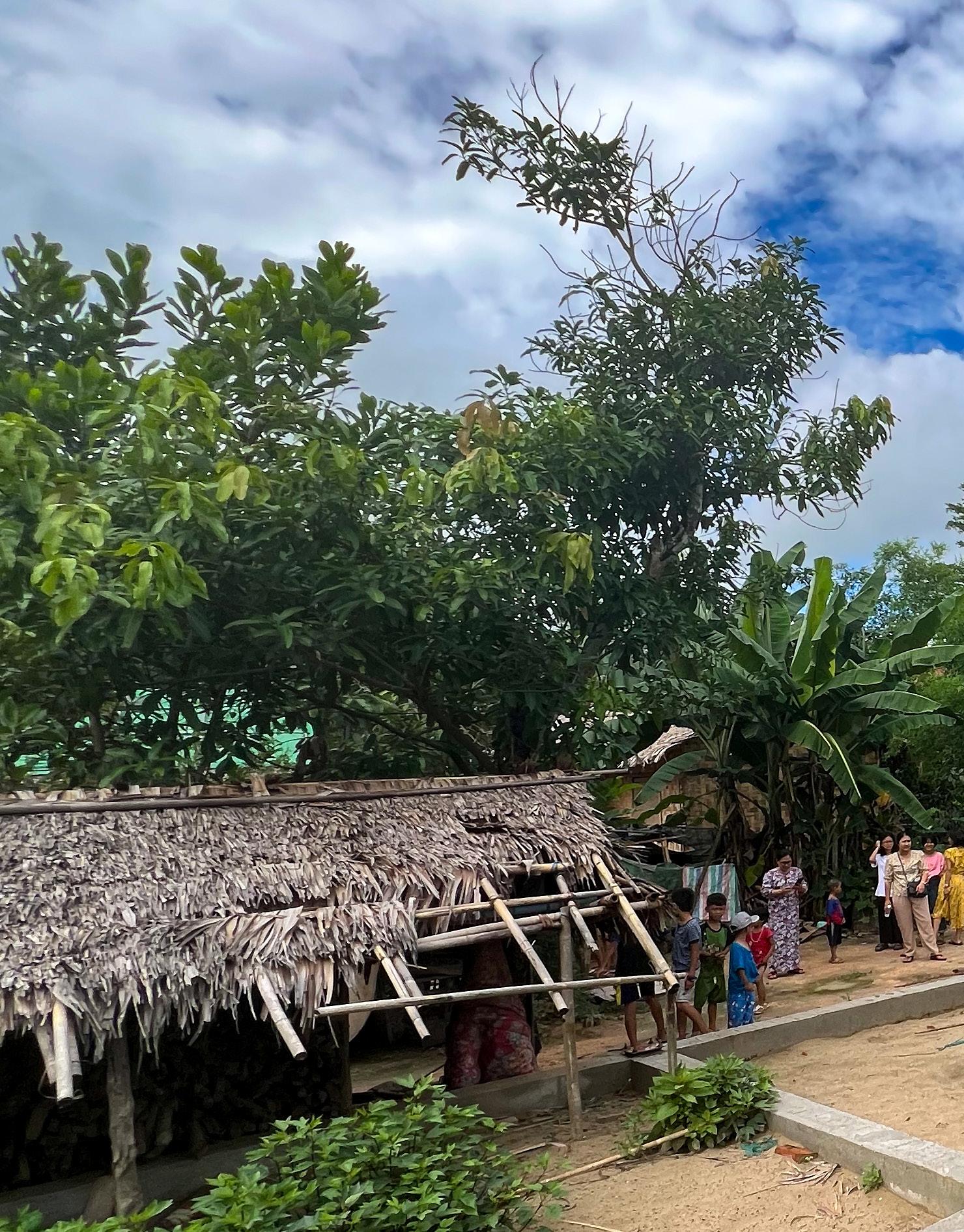

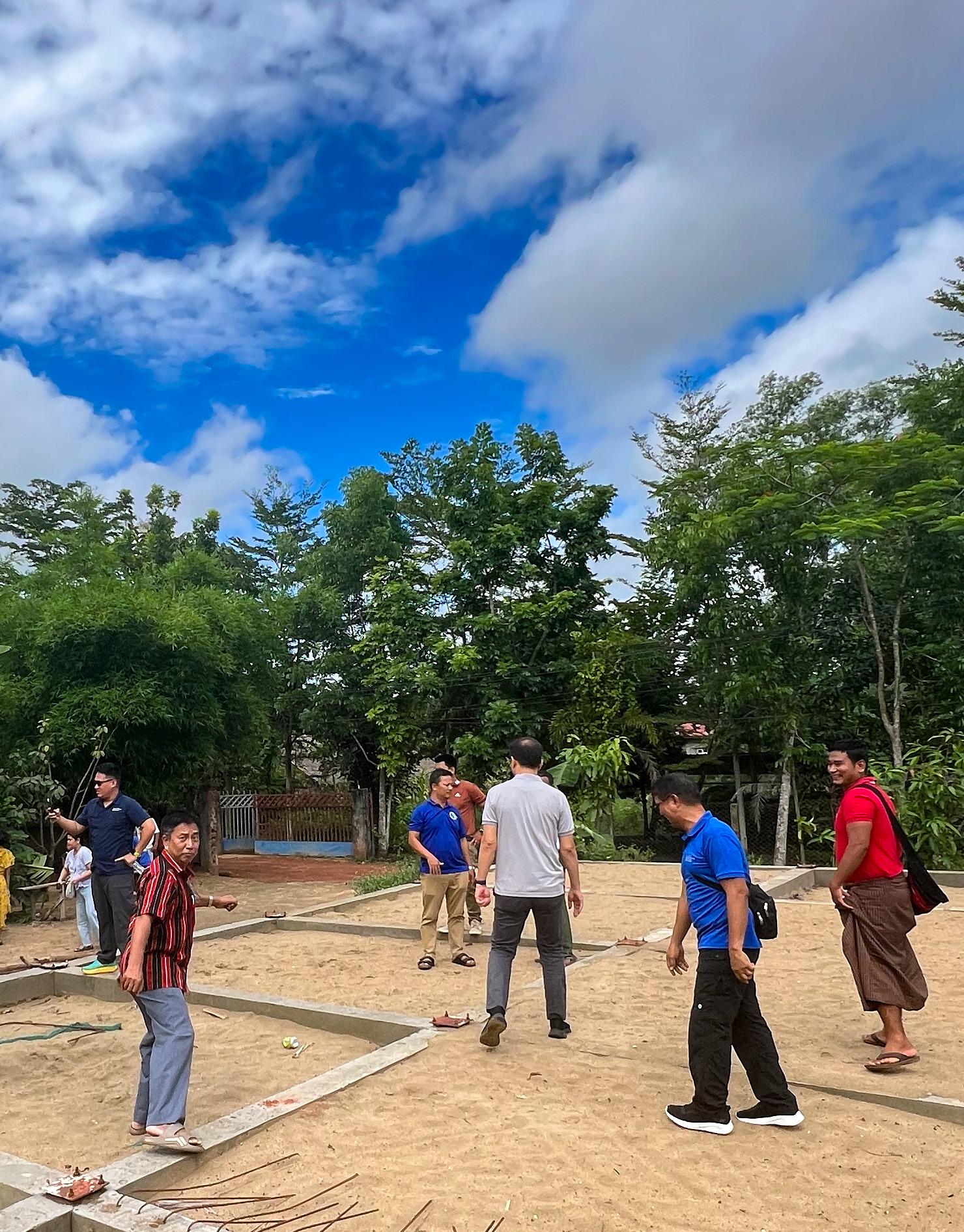
How the Church of the Nazarene in Myanmar stands in hopeful opposition to war, disaster, and displacement
By Brandon Sipes,

On a hot and humid afternoon in late May 2025, about a dozen Nazarenes walked carefully down a muddy, puddle-filled road in the outskirts of Yangon, Myanma. Some were local pastors and leaders, with others traveling from outside the country. Only a few had walked this road before, so most looked ahead in anticipation of what might come around the next bend. The vegetation clung close to the sides of the path, narrowing the way and hiding their destination.
After roughly a kilometer—and sidestepping a cow reluctant to move— the group veered off the path, crossed a small footbridge over a creek, and emerged into a dirt clearing. Simple wooden structures were just beginning to take shape. The corners and side supports for two small buildings were being lashed and nailed together.
Rev. Vula, a local pastor and principal of Chapman International College, where many Nazarenes attend, stepped forward excitedly and invited the group to gather around a small table and bench. “Welcome to our houses of prayer. When these buildings are finished, they will be open twenty-four hours a day for people to come and pray,” he said.
A reason exists why these houses of prayer are literally off the beaten path. Myanmar has faced near-constant conflicts since 1948, when it achieved independence from Great Britain. Ethnic groups have sought autonomy, with ongoing clashes against the military. The country has alternated between civilian and military rule, with the most recent coup in 2021 cementing the current regime’s control.
The 2008 constitution allowed power-sharing between military and civilian leaders, but the coup dismantled much of that balance. The military has violently cracked down on opposition
“Even in conflict, war, and hardship, God is still working and with us. Our Savior’s story tells our people that their pain is not ignored by God. God sees every tear, and He will bring justice in his time. We could not change our situation suddenly, but we can trust that God is redeeming even the darkest, hardship moments for his purpose.”
groups, limited political parties, and placed former leader Aung San Suu Kyi under house arrest. Christians, along with other religious minorities, face discrimination, while ethnic groups like the Rohingya continue to suffer violent persecution.
Pastor Tin Oo, who has seen these upheavals and changes firsthand, is the Myanmar Southern District NCM coordinator. “Since the military took control, one of the biggest spiritual challenges I have faced is helping people deal with fear, hopelessness, and anger,” he explained. “Many feel abandoned or confused about where God is in all this pain. As a pastor, it has been hard to see people lose faith or become discouraged.”
Rama, describes it simply, “Everything starts with fear.”
Despite the risks, pastors continue to serve. As religious minorities, they live with the threat of persecution and violence daily. Pastors carry clergy ID cards that can exempt them from military conscription—although their IDs can also make them targets.
Pastor Thazin is part of the Southeast District, where following Jesus comes with real risks. “To be a faithful disciple of Jesus now means to choose to live out Christ’s teachings, obeying his commandment even when it’s hard and dangerous,” she explained. “It means loving our neighbors, praying for those who are suffering, and encouraging them to live with faith. In this time of war and hardship, faithfulness means staying committed to prayer, serving those who are in need, and sharing the gospel of peace even though everything around us is dangerous.”

Since violence escalated in the past four years, displacement has soared—over 3 million people are now displaced across Myanmar. Many arrive in Yangon seeking safety. On the day the group visited the houses of prayer, they stopped at five Nazarene churches, all serving internally displaced people— those forced to flee their homes but remaining within the country’s borders—most of them children.
Rev. Adam is the district superintendent of the Myanmar Central District and has seen this response firsthand. “God is faithful and powerful,” he said. “[God] opens many new doors of ministry and gives us more power and authority. That's why we are able to keep increasing our ministry.”
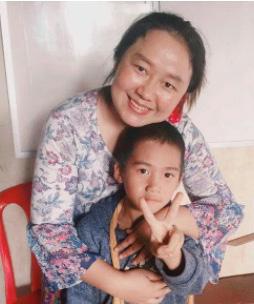
Sometimes, children arrive alone or with chaperones who soon leave. Four of the five churches the group visited had become homes for these children.
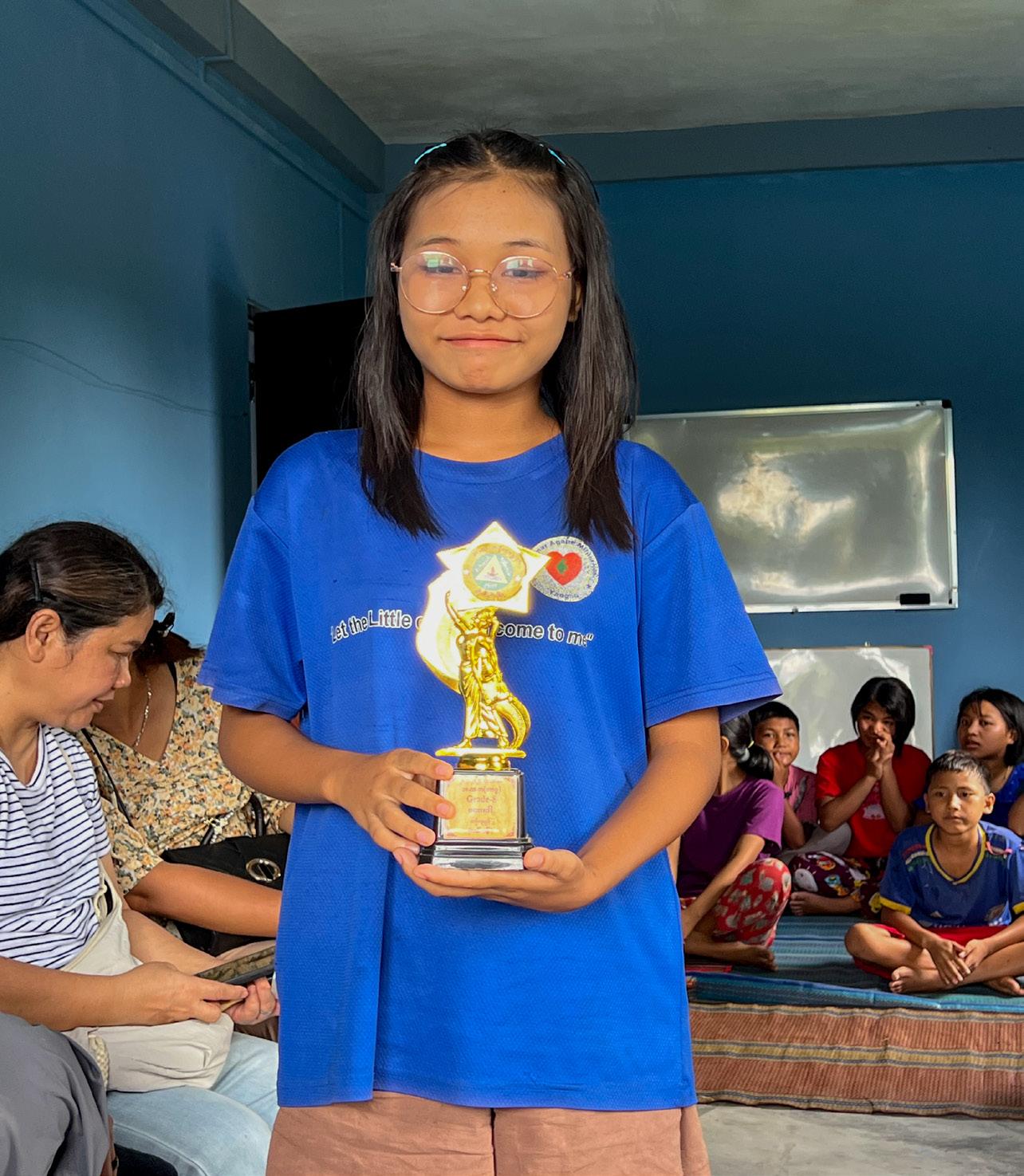
In one, two girls, ages 13 and 8, and a boy, age 12, told their story:
“Our father left many years ago, to another country to work. But he stopped sending money after a little while. My mother was caring for us, but there were too many days when fights and war broke out near us. So she made a plan to bring us to Yangon. But she became sick too and died not long after we arrived here.”
Now orphans, they live with nine other children at the church. One young girl proudly showed an academic award she won at a school the church helped her attend.
“These children, and dozens more, are being given shelter, food, trauma care, education support, and a model of faithfulness,” said Ram Thein. “Faithfulness is rooted in love. With a heart that loves Jesus, we offer many prayers together with our very lives.”
In March 2025, Myanmar experienced a 7.7 magnitude earthquake—the second deadliest in its modern history, killing over 5,300 people Nazarene leaders quickly mobilized, despite the
risk of military checkpoints. They brought food, water, and spiritual care, and made plans to provide trauma support to children in local schools.
“At times, I have felt deep anger toward the dictator of our country and even wished for his life to end. But when I reflect on how Jesus responded to the Roman soldiers who oppressed him—with forgiveness and love— my heart begins to change. I start to hope not for my enemy’s destruction, but for his transformation, and for reconciliation among our national leaders who are now at war.”
Jasmin Eugenio is the Sea Field NCM coordinator and remembers the school’s response clearly. “The headmaster welcomed this initiative, sharing that while many groups had provided food, clothes, and medicine, no one had yet focused on the emotional needs of the children,” she said.
Ram Tin Par is the NCM coordinator for the Myanmar Central District and has seen God’s transforming work firsthand. “At times, I have felt deep anger toward the dictator of our country and even wished for his life to end,” she said. “But when I reflect on how Jesus responded to the Roman soldiers who oppressed him—with forgiveness and love—my heart begins to change. I start to hope not for my enemy’s destruction, but for his transformation, and for reconciliation among our national leaders who are now at war.”
These houses of prayer, the crowded church homes for displaced children, and the steadfast pastors are all signs of God’s faithful work in Myanmar—making all things new, mending what is broken and restoring what has been destroyed.
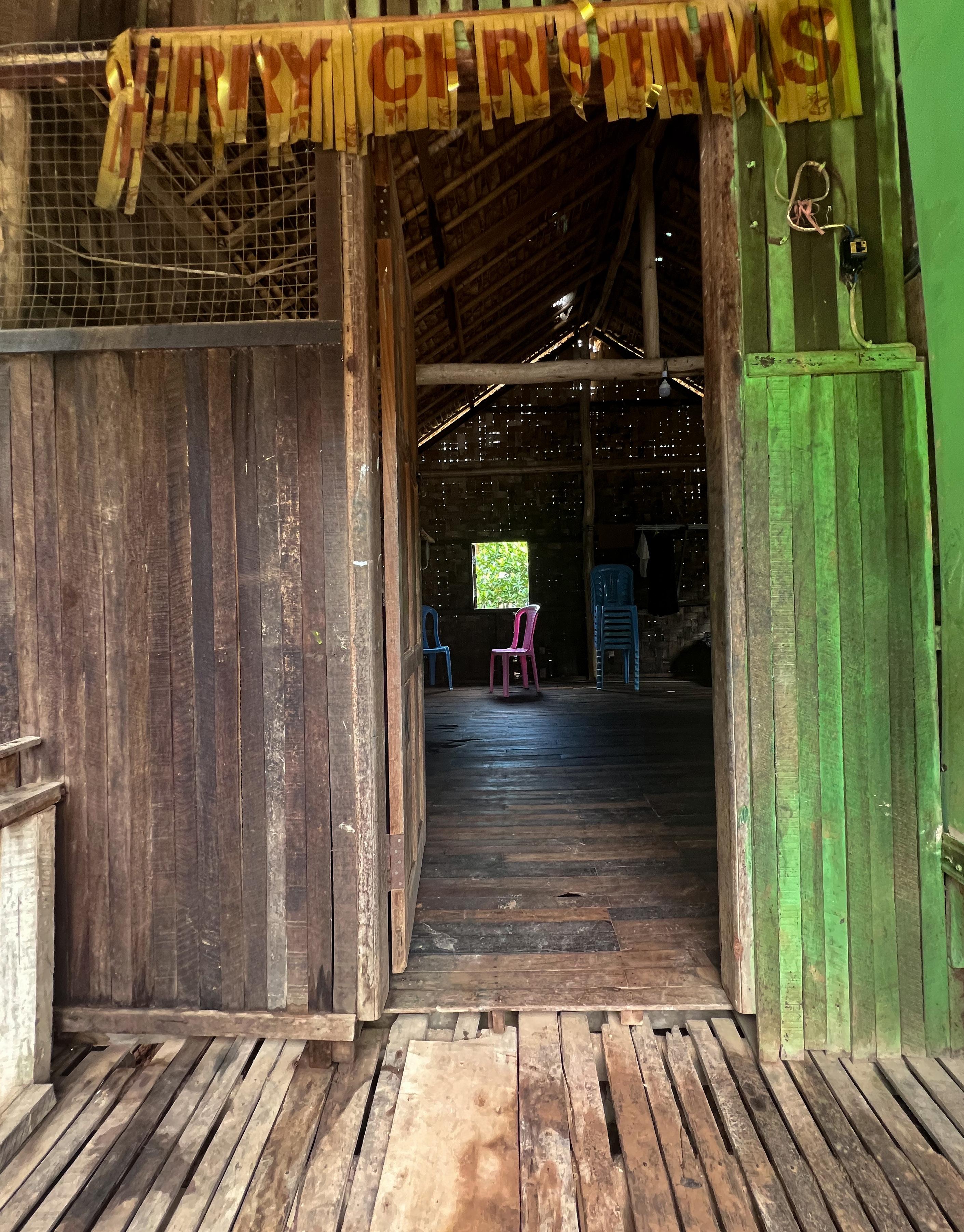
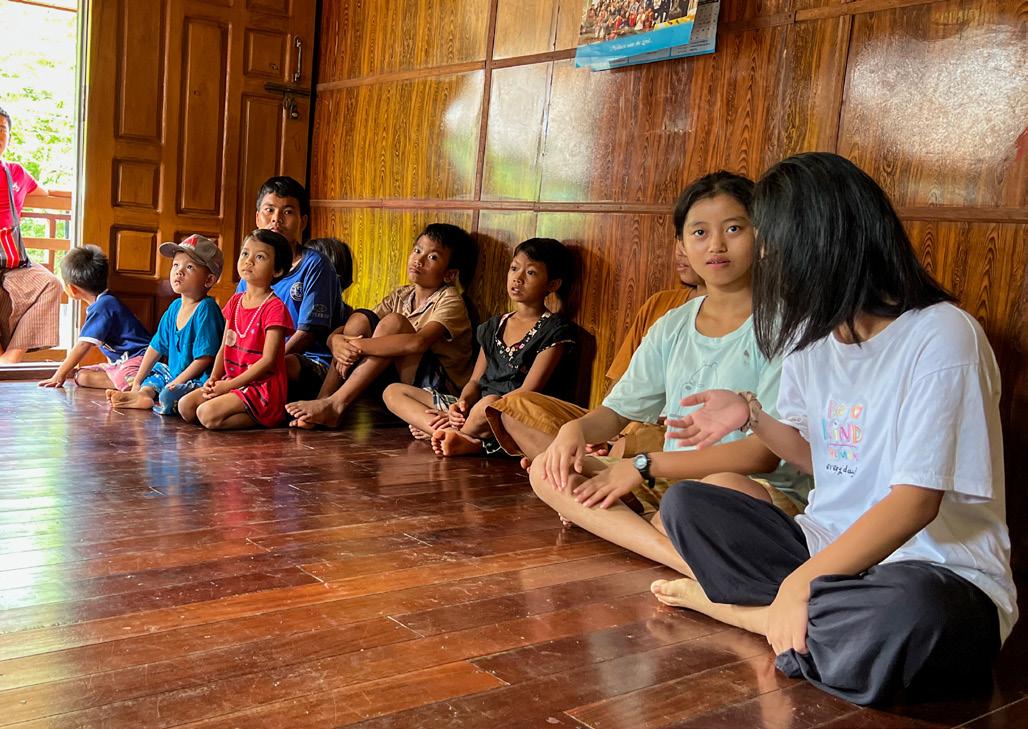
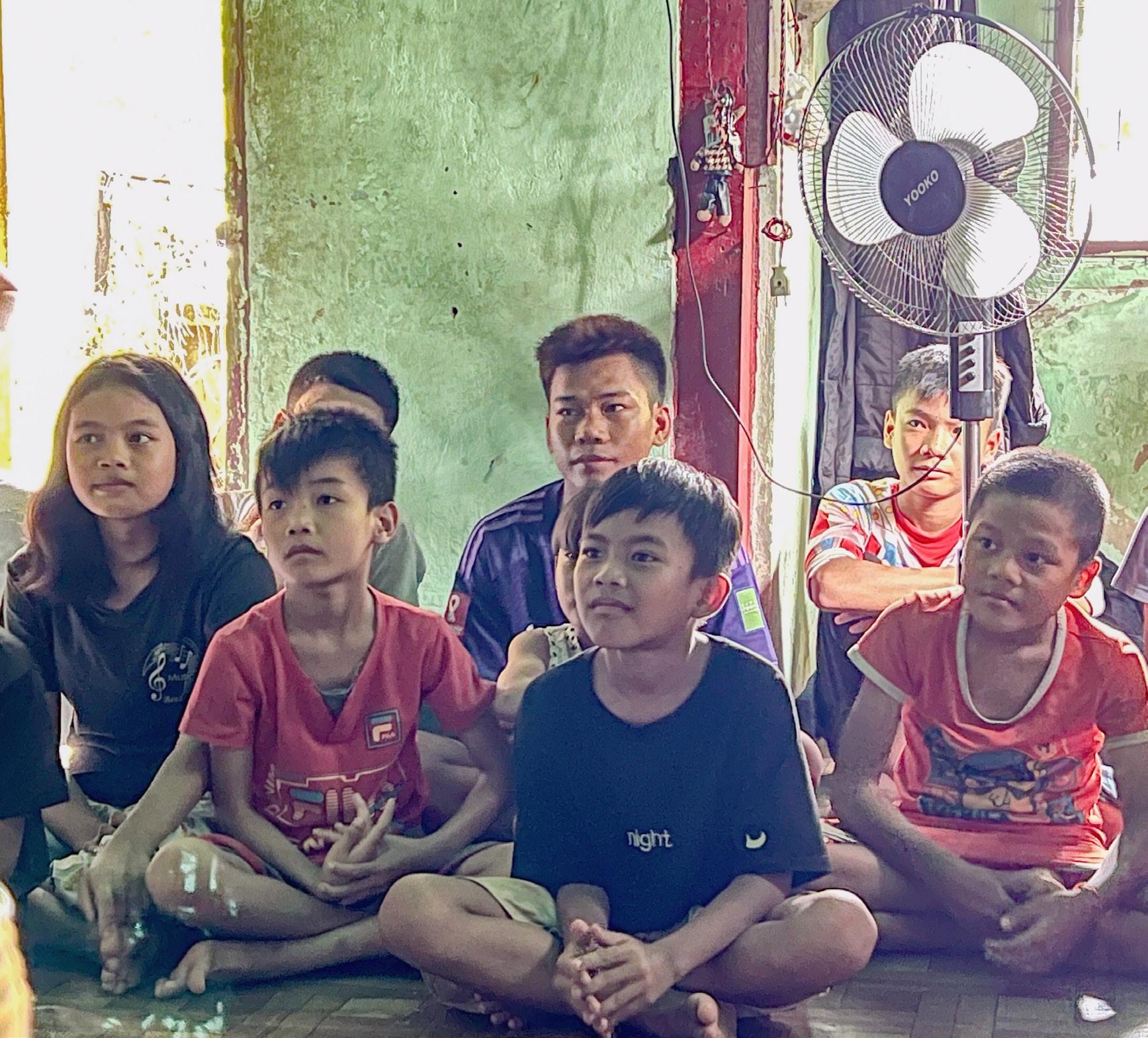
In Myanmar, churches have become safe havens for children separated from their families by conflict.
By Kristin Burchfiel, Western Mediterranean Field
How one Nazarene

It’s Saturday morning in Moncalieri, Italy, and the Church of the Nazarene’s building is bustling with energy in this town situated at the foothills of the picturesque Italian Alps.
The aroma of coffee brewing brings smiles to many faces as Pastor Matteo Ricciardi visits with neighbors and the church’s food distribution program participants out front, in the place that has become a gathering space for the neighborhood in recent years.
Just off to the side, the church’s recently purchased van has arrived, full of fresh food donated from nearby supermarkets. Volunteers have formed an assembly line to unload and sort the food for each family that will arrive today to collect it.
And so it goes every Saturday with this group, half of them church members and the other half community service workers, serving as part of the church’s agreement with the local court system to provide community service opportunities for those
needing to complete their required hours. Domenico is one of the workers who learned about the program through the court system and was drawn to the opportunity after speaking with Pastor Matteo. Though he grew up in Moncalieri, Domenico had never heard of the Nazarene church, but he quickly became interested in helping support families in his hometown, even using some of his connections in the community to secure more weekly food donations that he picks up throughout the week.
When asked about his favorite part of serving in the program, he said, “I like the feeling at the end of the day. I am a golf player, and normally, on Saturday mornings, I like to play golf, but during this time, when I come here and then I go home around lunchtime, I have a feeling that I didn’t waste time. The feeling remains with you at the end of the day, and I feel it is the best thing.”
The Saturday morning routine highlights the real value of this program: creating community. In an effort to bridge the gap for those who cannot afford enough food on a regular basis, a network of people from the church, the neighborhood, local supermarkets, the national food bank, and the court system has emerged.
bringing people together and responding to immediate needs,” explained Pastor Matteo.
“While the primary issue addressed is the limited access to basic food items among vulnerable families in the community near our congregation…the program has become a stable resource, addressing both basic food needs and social isolation in an effort to build relationships within the community,” he continues.

Like many places around the globe, Moncalieri has a mix of long-term residents and immigrant families. Growing national poverty and unemployment rates have created a greater need for food assistance, particularly among the most vulnerable groups. Then, in April 2020, the COVID-19 pandemic lockdowns exacerbated the situation, with many families experiencing financial hardship due to job closures and restrictions. This is when the church decided they could do something to serve their neighbors.
What began as a small, self-funded initiative has developed into a structured support program, thanks to partnerships with local stores and Italy’s national food bank network operated through the Italy District Church of the Nazarene’s non-governmental organization (NGO), Associazione Missione Nazarena Italiana (AMNI). As public social services face increasing strain, the initiative now provides essential aid to families and individuals in need, and the congregation has become a vital resource for those in vulnerable situations.
“Our congregation recognized this need and stepped in to provide support… that is particularly useful because it serves as support for immigrant families who may face additional barriers in accessing social services, and it promotes community solidarity by

Through the program, 98 people from 44 families receive food each week. Additionally, the church collects and distributes clothing items and organizes community meals. Relationships are developing as weekly life updates are shared and requests are prayed over. And this community has learned to celebrate and grieve together like all good communities do. Over the years, there have been cancer diagnoses and answers to prayer for healing. But there have also been hard times. Domenico explained that there are difficult seasons to serve in, mostly during the holidays, when the church hosts meals and invites everyone who participates in the program in any way to come together for a potluck. “Christmas time is the most difficult because the emotions of the people are increased,” he said. “I know that in that moment I cannot do anything for them, just try to give them food, and I try to give them a few words just to put them in a good mood in the moment.”
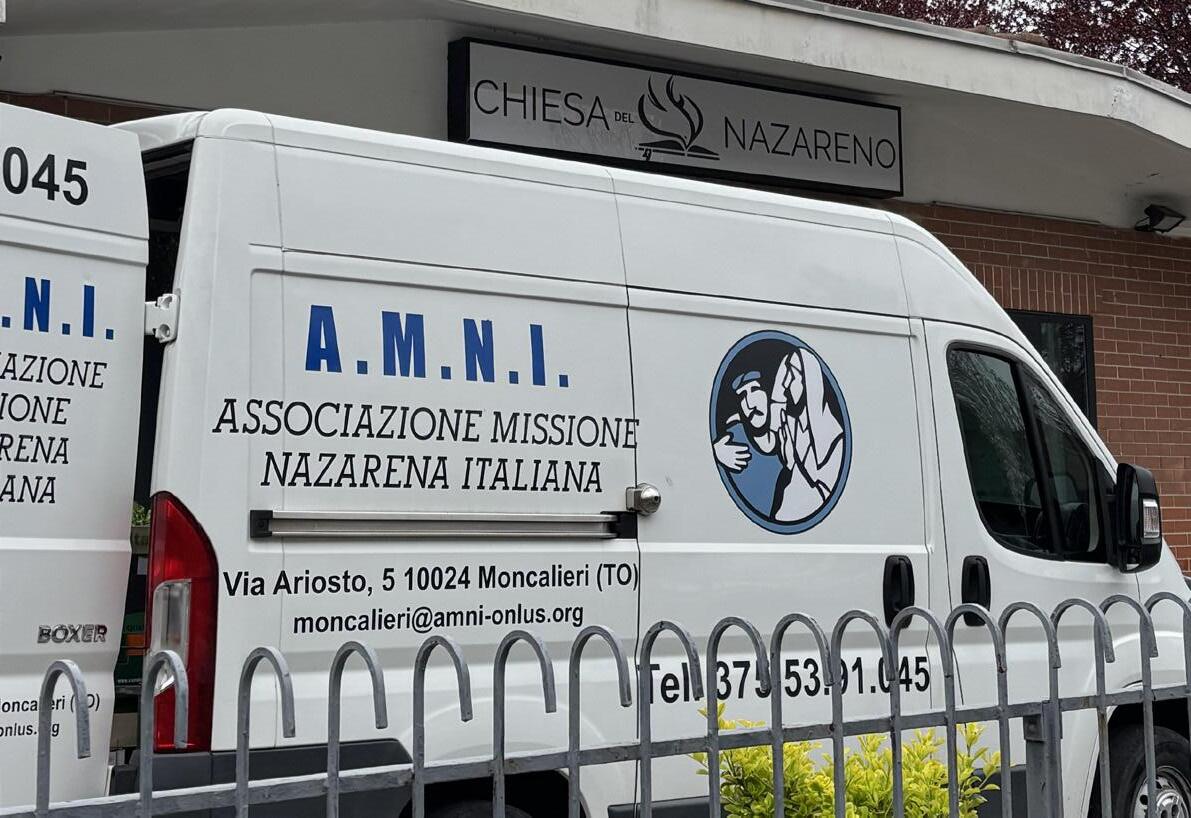
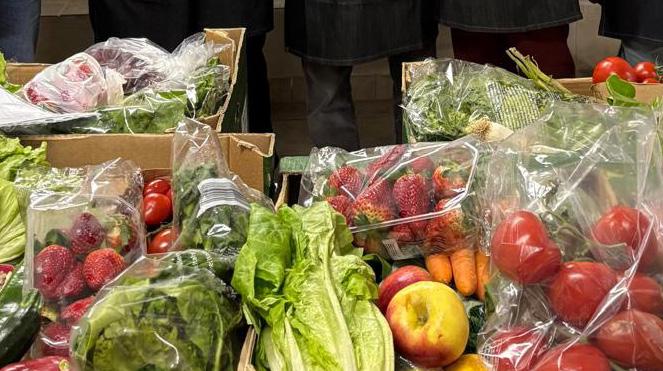
As relationships continue to grow and develop, so do the operations. In partnership with Nazarene Missions Teams and a team from the Chicago area, the church recently remodeled its sanctuary space to create more room for their food distribution warehouse. Additionally, in partnership with Nazarene Compassionate Ministries, stainless steel shelves and a highcapacity refrigerator were purchased.
The congregation was also able to purchase a van that helps with ease and efficiency for picking up food and unloading it into the warehouse, instead of volunteers using their personal vehicles to go around collecting food each week. “With the customization with lettering (on the van), the service is gaining a higher visibility…testifying to the church’s presence in the neighborhood,” explained Pastor Mateo.
Another volunteer has seen the opportunity

to share his faith with the community. “The good witness we give makes some people ask us why we engage in this service,” he said. “They are intrigued by our community, and also through other gatherings, we really manage to give witness to the neighborhood.”
As God continues to grow and bless this ministry, the church hopes to expand its reach. Thanks to the van—the capacity to collect and distribute food has increased, and the church hopes to be able to serve more people each week, reducing the number of families currently on the waiting list. The program also hopes to strengthen its partnerships, collaborating with other supermarkets and organizations to ensure more consistent and diverse food supplies.
In the end though, the goal remains to be a faithful presence in the neighborhood and to have a holistic impact on the lives of those around them. Pastor Matteo says, “In addition to food distribution, the program aims to raise awareness of the church’s mission and foster deeper connections with neighbors, and to provide spiritual and emotional support through community.”
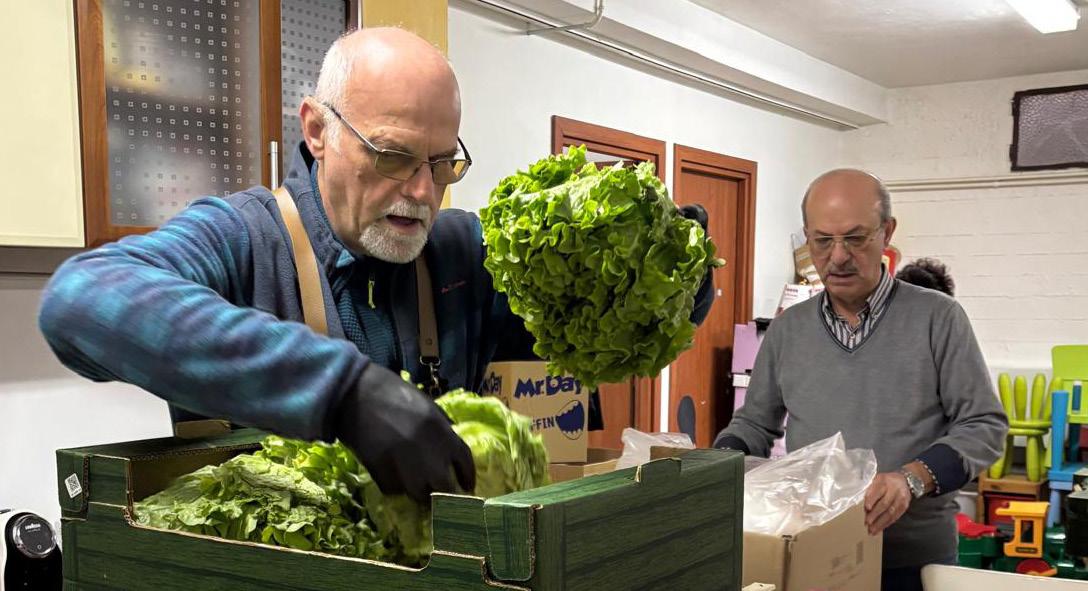

By Purevtseren Khaltar, NCM Coordinator for Mongolia

In Ulaanbaatar, where winter temperatures can plummet to -40°C, a different kind of church gathers, one not defined by its architecture but by its warmth, compassion, and open doors. It is affectionately known by those who attend as the "Homeless Church."

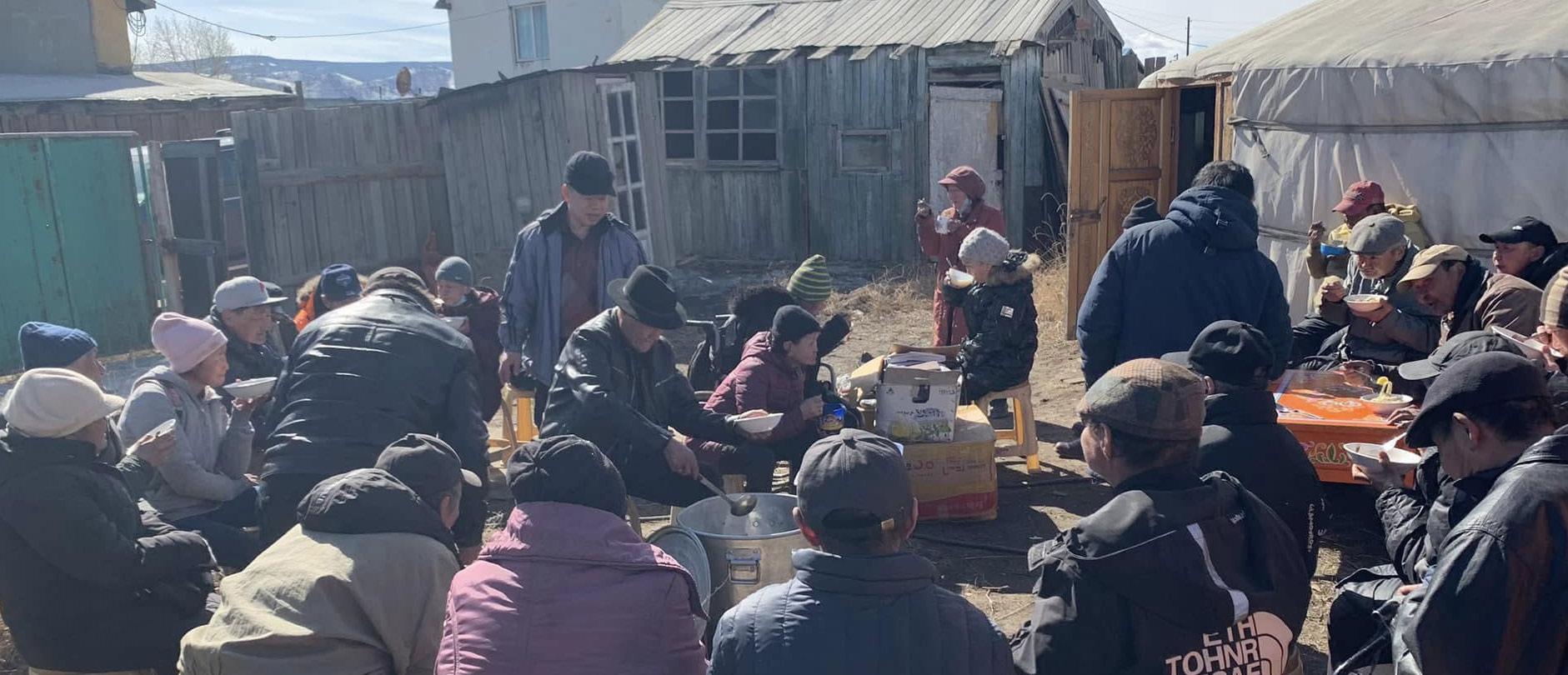
This is not a metaphor. The congregation is made up of men and women who sleep on the streets, live in underground heating tunnels, or take refuge in abandoned buildings. Yet every week, dozens come together for worship, food, fellowship, and healing.
After coming to faith in 1993, a Mongolian man, Puje, now the founder and pastor of this unique ministry, began serving as a small group leader and church board member. He eventually felt a pull to serve the most marginalized. For ten years, he ministered in prisons, bringing the gospel, counseling inmates, and advocating for those society had discarded.
“When the communist system collapsed, our country faced a crisis. Prisons were overcrowded and under-resourced. People were dying from malnutrition and tuberculosis,” he recalled. “God

opened my eyes to their pain.”
After two years of theological study in the United States, he returned home with a renewed vision. This time, he focused not only on those behind bars but also on what happened when they got out.
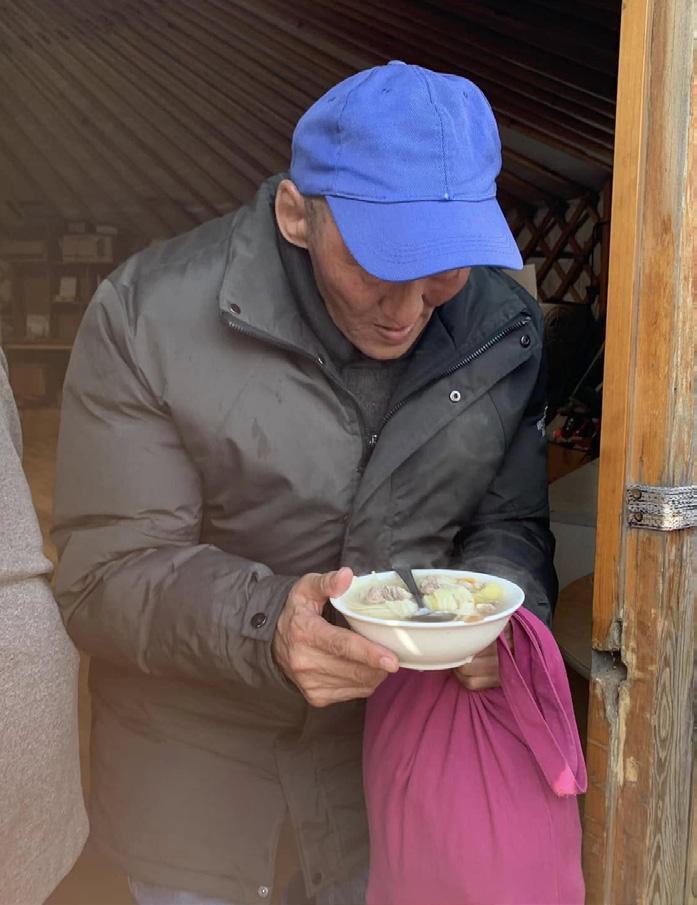
“Many released prisoners were homeless. Some had no families to return to. Others were so hopeless, they didn’t want to leave prison at all,” he said. “I saw some reoffend just to go back.”
In 2010, he rented a large building and launched a church for ex-prisoners. It started with twelve members. But soon, he noticed others on the streets—homeless individuals not coming out of prison but suffering the same.
“God broke my heart again,” he said. “I realized we needed to serve them too.”
Ulaanbaatar is the coldest capital city on earth, with brutal winters and a rising homeless population. As of a 2018 report, there were over
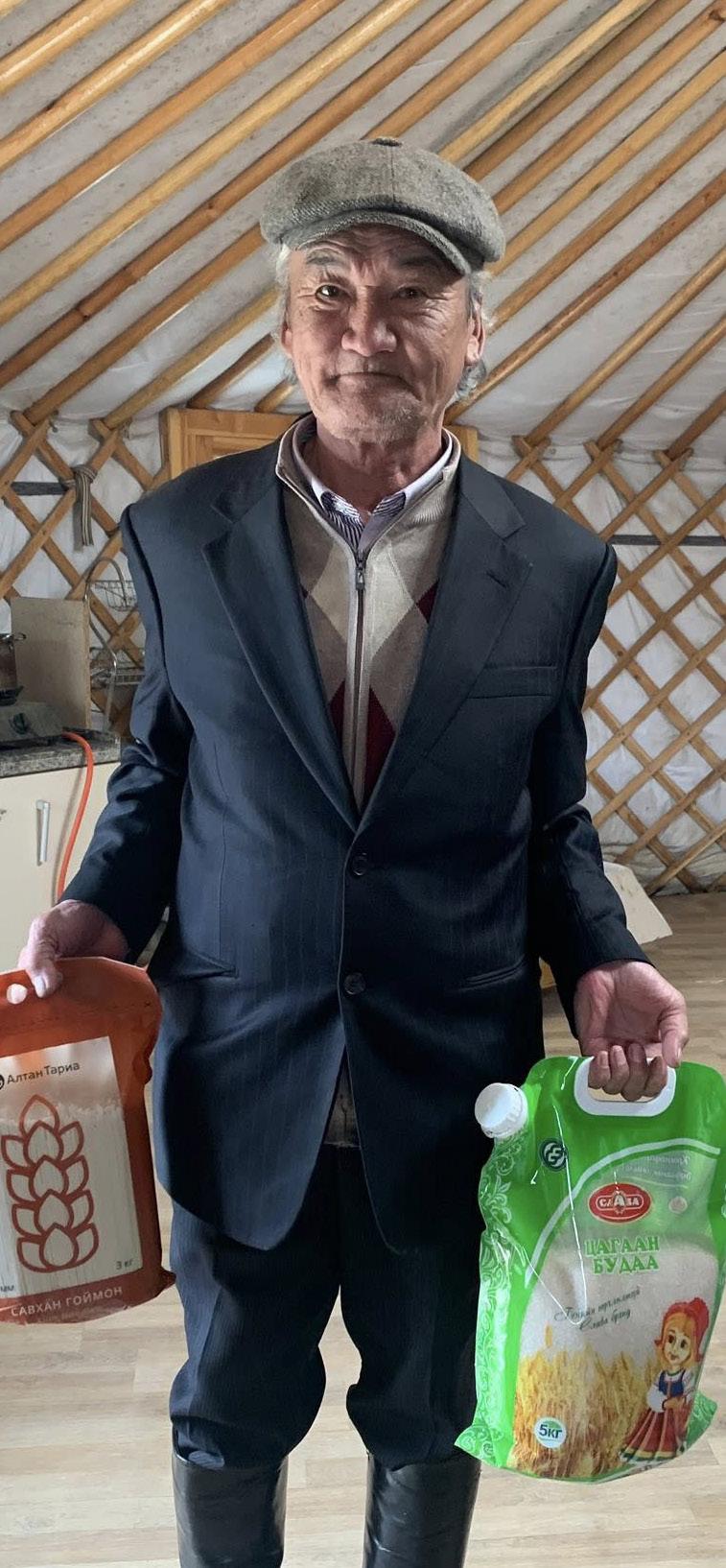

10,000 homeless individuals in the city, a number that has likely increased due to economic hardship, natural disasters, and widespread alcoholism. The rural poor often migrate to the city after losing livestock to harsh weather, only to find limited job opportunities and soaring living costs.
Against this backdrop, the Homeless Church has become a sanctuary.
Between 50 and 70 people, including Puje and his family, gather every Tuesday and Friday. They study the Bible through Emmaus correspondence classes, sing worship songs, and receive hot meals. On most days, there’s also free medical care, haircuts, and donated clothes. To manage the growing numbers, they’re divided into four groups.
“This church saved my life,” said one church attendee, “I came to the city with nothing. I slept in underground tunnels to stay warm. I was addicted to alcohol. But here, I found people who didn’t judge me. They gave me food and reminded me I’m still a human being.”
Puje intentionally works with believers to serve in various roles—from cooks and cleaners to praise team members and evangelists.
“We want them to know that they have value, purpose, and gifts to offer,” he explained. “This is their church.”
Serving and learning together help remind church members of their God-given worth, dignity, and value. The message at this church is clear: God has good plans and purposes for your life, and you can live a life that reflects the purpose.
“I was homeless for five years. I lost my family and lived by begging,” one member said. “But when I came here, they treated me
like a sister. Now I help cook meals during service. I even sing in the worship team. I never thought I could have this kind of life again.”
The work of the Homeless Church is more than just weekly gatherings. It’s a full wraparound ministry. The ministry partners take members to public bathhouses and cover the cost. They gift traditional Mongolian gers (yurts) to families through donations. They help provide mediation and reconciliation to individuals with estranged relatives, restoring
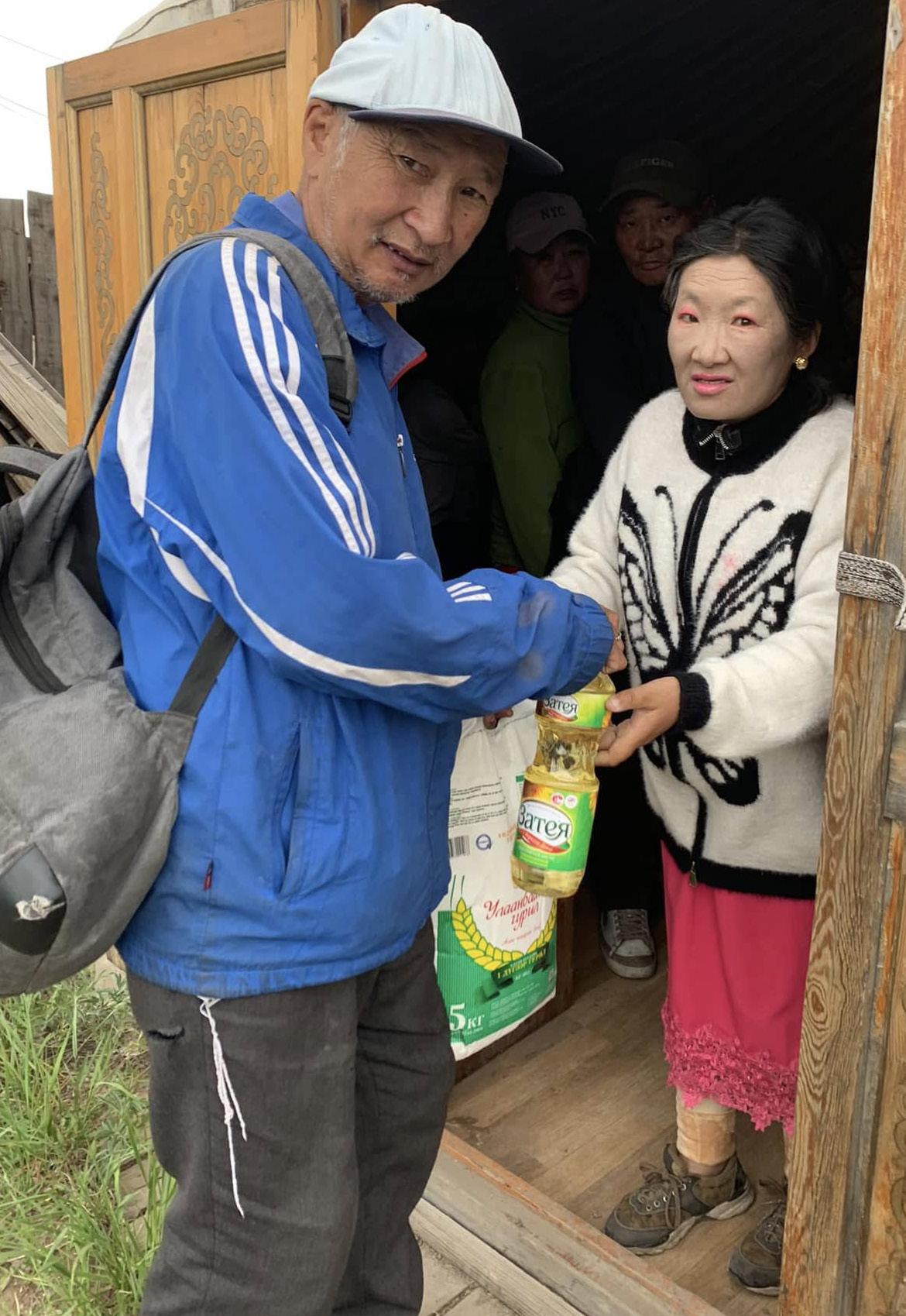
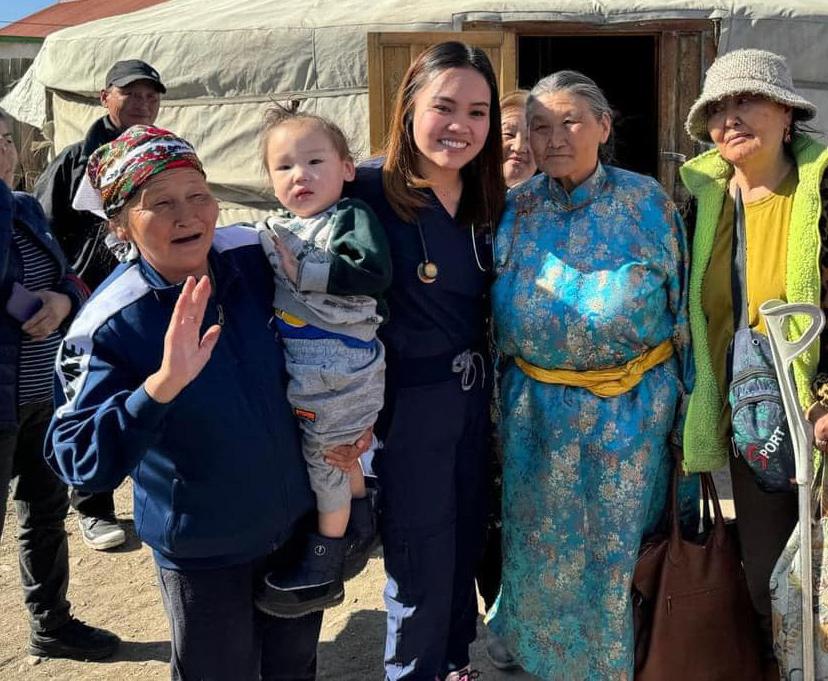
families and bringing healing. And when funds allow, they distribute food and hot drinks on the streets.

Even national holidays and festivals are celebrated together—Christmas, Easter, and Gospel Days become moments of joy for people who feel society has long forgotten them.
In colder months, many homeless people seek refuge in underground heating ducts. But these are dangerous. The systems are outdated—some from as far back as the 1950s—and can leak, burn, or cause suffocation. Frostbite is common, especially for those who struggle with alcoholism or other addictions.
“Our doctor has bandaged countless wounds,” Puje said. “We’ve seen people lose fingers, toes—even limbs. But we never turn them away. Every scar has a story, and every person matters across the country.”
The Homeless Church’s mission is clear: to help people recover from addiction, build
spiritual community, and live lives rooted in biblical principles.
“Addiction is not just a habit—it’s a wound,” the pastor shared. “We use God’s Word to heal those wounds.”
Many of the once-homeless members now participate in farming, harvesting, and other meaningful work. Others have returned to the countryside, this time with hope and stability.
The long-term dream for this ministry is to have a permanent space—a center where discipleship, shelter, rehabilitation, and skillbuilding can happen under one roof.
For now, though, the rented yurt and borrowed resources are enough. Inside, the warmth is real, and the hope is tangible.
“We have nothing fancy,” Puje said. “But we have God. And we have each other.”


By Brandon Sipes, Humanitarian Crisis Advisor
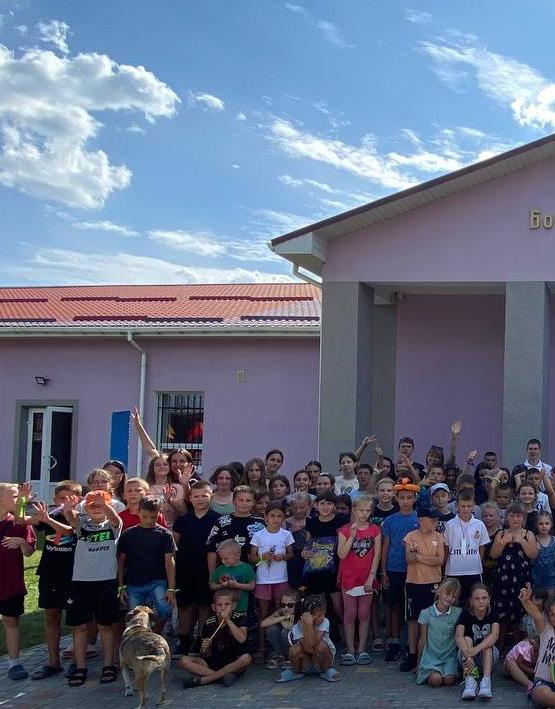
Over three years after Russia invaded Ukraine, the war continues. Reports of violence on the fronts, drone attacks, or political moves at play have become a daily feature. When an invasion like this occurs, there is often the early and earnest hope for a quick resolution and swift withdrawal of armies from one another. But as time marches on, hope can be harder and harder to find.
For the Church of the Nazarene in Ukraine, the call to proclaim hope and serve the most vulnerable remains the same. Over these three years, churches have distributed food, provided shelter, served people displaced by the war, offered care for trauma and mental health, and continued announcing the good news—the good
news that God wills the world another way, and one day it will be that way.
In April, pastors from each of the five active churches, along with other district leaders and the district superintendent, gathered in Kozyatyn to encourage one another, take stock of where the church is, and envision the future. Together, they spoke about the challenges the war has
brought, how to continue serving their communities, and how following Jesus shapes them in the midst of violence.
“The biggest challenge is to answer the question ‘Where is God?’ that is asked by those who have lost their homes or loved ones,” shared Svetlana Kleschar, district superintendent for Ukraine. “In such a case, we should be especially careful quoting the Bible. At the same time, it is necessary to emphasize the love of Christ. This war has torn apart many families. One of the challenges is a lot of divorces in the families, with children growing up without parents and upbringing often taking place online.”


allow little children to be killed in their sleep by rockets? Why can an entire family be wiped out in a single night by a drone strike on their apartment?
And these are just a few of the hundreds of questions we hear. The greatest challenge is answering those questions — while at the same time bearing witness to a loving God, a God who saves, who protects, and who gives hope.”
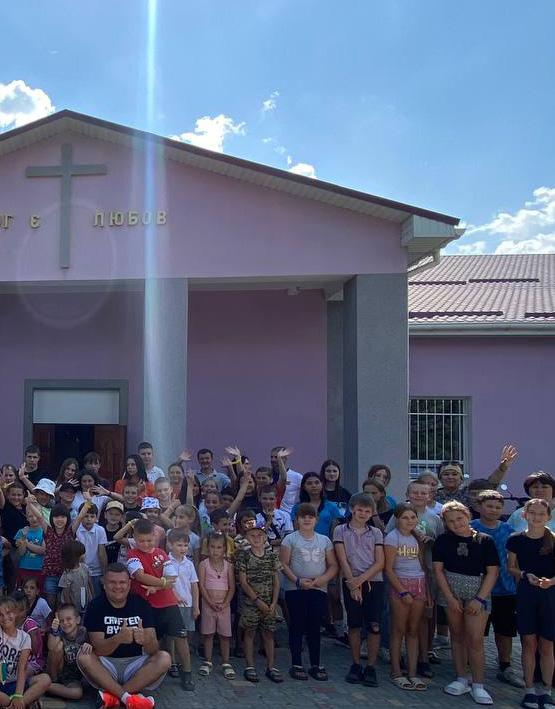
Svetlana also reflected on how the gospel speaks into this season: “Our hope is in Jesus. Life goes on even during the war. The Lord does not abandon us. He gives us hope for tomorrow. I believe the concept of sacrifice becomes more understandable during the war. We are grateful to our defenders who protect us in earthly life from the enemy; the more grateful we should be to the Lord who saves us for eternal life. This is not the end despite all burdens the war brings.”
For Serhii Akulenko, pastor of Kiev Pozniaky Church and Ukraine District NCM coordinator, the pastoral journey began unexpectedly: “I became a pastor out of necessity — simply because there was no one else left to do it… An even greater challenge was that there were no mature spiritual leaders left in the local church — no one who could fully support or guide the ministry. At the same time, many people who didn’t know God at all began coming to the church in search of help…about 80 percent of the people are in that category.”
Those who come often bring difficult, heartfelt questions: “Why does God allow innocent civilians to die? Why does he
He finds deep encouragement in remembering that Jesus himself knew suffering: “Some may falsely believe that God is far away and doesn’t understand what we’re going through. But when we look closely at the life of Jesus Christ, we see that he experienced much of the same suffering, loss, and hardship. He knows what it means to hurt. He knows what


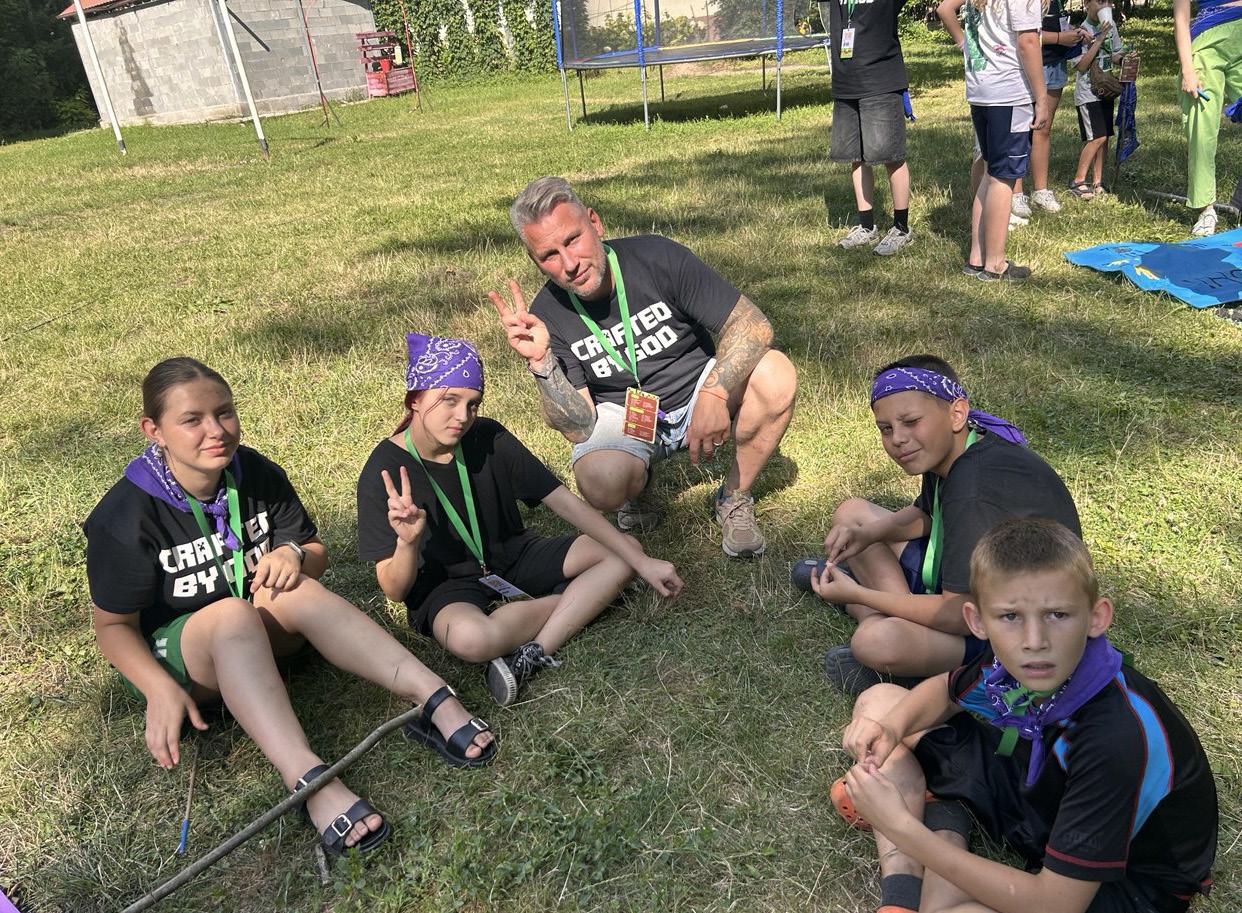
weight. That means he understands us deeply. He grieves with us. And he offers the hope that this is not the end.”
At Kozyatyn, Pastor Irina describes the steadfast witness of the church: “Being faithful is staying the course and doing it with passion… From the very beginning of the war, the church became the place where the people can find safety and stability. I do not mean safety from being shelled by rockets, but God’s safety.”
Her hope remains anchored in God’s sovereignty: “Of course God gives me hope… We have to agree that it will be the way God wants it to be. We are learning this. It’s hard and we don’t understand a lot of it. But we have to have hope. We can’t rely on people. We are not putting our trust in anything but God. We know God will send his people to us.”
The war is not over. The loss is still deep. Yet through every act of compassion, every prayer lifted, and every word of hope spoken, the Church of the Nazarene in Ukraine continues to embody the love of Christ. May we join them in steadfast prayer— trusting in the God who has not abandoned them and who is still writing the story of redemption.


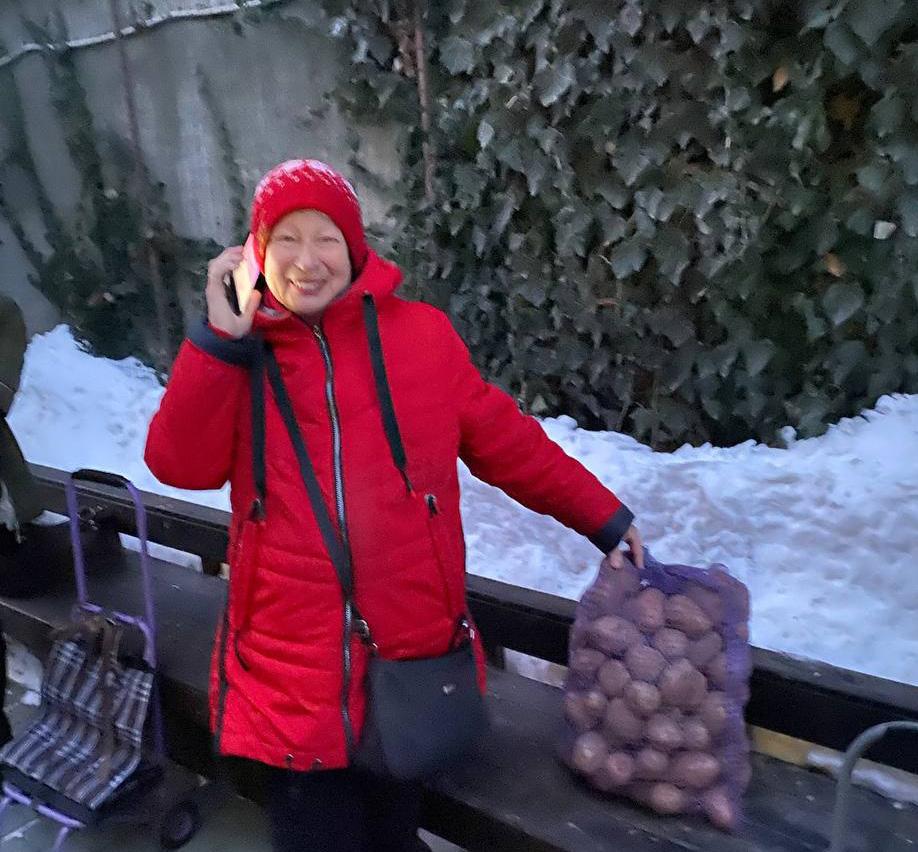

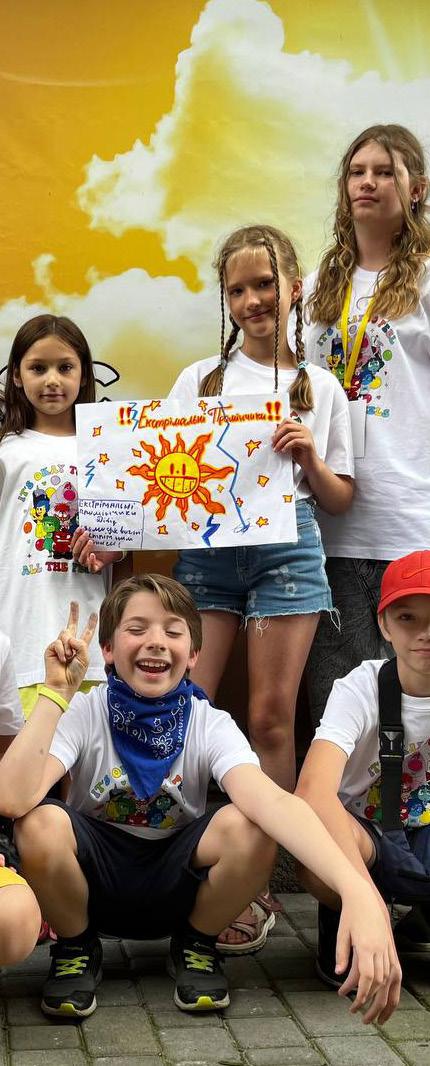


By Nayara
Siloé is one of the most stigmatized neighborhoods in Cali, Colombia. It developed to house coal mine workers and became known for violence and poverty. Conflicts between armed groups left lasting wounds, and the neighborhood still lacks public services.
Often described as “close to heaven” for its mountain views, Siloé is also home to the Church of the Nazarene, born out of the violence experienced by the local pastor's family.
Pastor Steyner Pietro lost his brother in this community when he was still a teenager. The pain of mourning made him reject the love of God, but years later, God used that moment of affliction to call him into pastoral ministry. Steyner is now the pastor of the Church of the Nazarene in Siloé. “That moment was very painful for everyone. My mother, my father, my family… Losing my brother was very difficult for me, for he was a very special person. [But out of that loss] God gave me passion for this neighborhood,” he said.
After a youth camp, Pastor Steyner reconciled with God and decided to serve his neighborhood to prevent other young people from becoming victims of violence. At first, he thought studying to be a police officer was the way forward. “I finished high school and went to do a police course. My thought was: I have to prepare to help; within the institution of the police, I would have the authority to help my neighborhood, my community, and everything else,” he said.
God, however, called him into ministry. Sixteen years ago, the church began with only 15 people. From the start, they knew that in addition to sharing the message of salvation, they needed to serve the community and help transform lives.
The work began in a house and soon moved to a rented space once used as a gambling house and smuggler’s hideout. God transformed the story of that place and the lives of the people connected to it.
Inspired by Matthew 9:36, the church began serving breakfast to neighborhood children, later adding lunch. Though the group was small, they shared what they had. Soon, neighbors joined in, donating rice, eggs, and flour to make arepas.
Pastor Steyner has seen God’s provision again and again. “God always acted and helped us in one way or another. The people from the church who began to meet shared the vision among themselves,” he said.
The Feed My Sheep project cares for about 40 children between the ages of 9 and 13. Many spend long hours alone or under the care of extended family



or siblings. Inside the church, they find a safe space to be accompanied, cared for, and supported academically and spiritually.
The children take literature, spelling, and discipleship classes. Last year, they studied The Chronicles of Narnia and presented a theatrical play. This year, they are studying Pinocchio, Proverbs, and Psalms, exploring the values in each story and the ways Scripture can shape their lives.
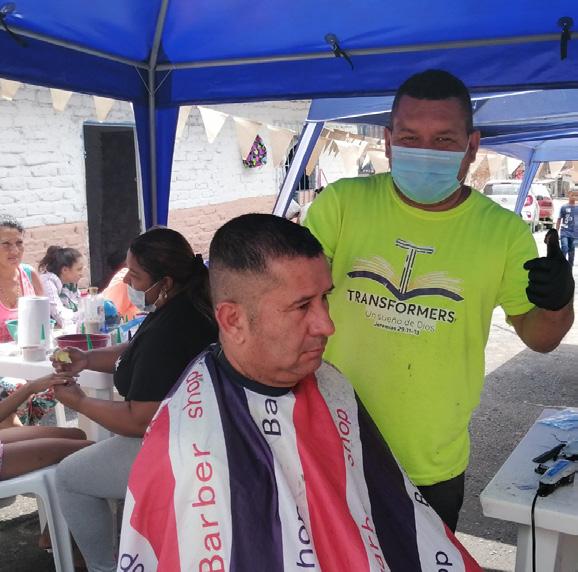
The daycare began nine years ago to help young, single mothers who needed safe childcare but couldn’t afford it. Nelly Sogamoso, one of the founders, remembers: “We started with nothing, only the physical space and a heart willing to serve.”
The team calls the project the “hogar infantil” (children’s home), where children from one to four years old receive care, love, and protection as if they were family.
Jesica Dorado, one of the teachers, has seen the impact of love and care. “One of the most beautiful testimonies was that of a child who, at the beginning, did not greet anyone,” she explained. “He came from a very complicated family environment. When he arrived, he [was quiet], sat with his arms crossed, did not speak, and only listened to the class. He did not allow anyone to say anything to him.”
With patience and the love of Christ, change came. “Today, after spending a good amount of time in the project, that same child has changed a lot. Now, when he leaves, he says goodbye, hugs the teachers, and says: ‘Teacher, thank you very much!’ These small gestures reflect the great impact that the project has on their lives,” she said.
The Transformers project creates spaces for teenagers and young adults to grow into the image of Christ. About 80 youth participate in gatherings across the community, from sidewalks and homes to soccer fields and the church.
Yuly Marian Cruz, one of the leaders, explained: “To open a new point, we carry out an evangelistic campaign. We hold an activity we call ‘Sitting at the Table,’ inviting people to hear the gospel and share a snack, often hot chocolate.”
The ministry also organizes soccer tournaments and classes for parents, helping families flourish and giving the community a new imagination for life. To support economic development, the church offers a barbering course taught voluntarily by a professional barber. Two classes have graduated, and a third is about to start. Alongside technical training, students participate in devotionals to discover God’s purpose. About 30 have graduated—some opening shops, others working from home or in professional barbershops.
“Every activity is designed to strengthen their overall growth and development.”
Teacher Janet Sánchez shared: “For me, this work means a lot. I dedicate myself as if these children were mine. I care for them and worry about them with all my heart.”
With support from Nazarene Compassionate Ministries, the project now provides meals and a warm, engaging environment. Coordinator Marly Cerezo and teachers Janet Sánchez, Nasly López, and Gisela Parra share a common dream: “Why not double the number of children?”
In addition to these projects, the church serves about 150 lunches each weekday at its community dining hall.
Siloé’s description as “close to heaven” fits not only its mountain location but also the way church ministries allow people to experience the hope of heaven through tangible acts of love, bringing the presence of God into daily life here and now.


For many Iraqi families, home is no longer a place of safety or peace. Years of conflict have forced millions to leave behind everything they’ve ever known—homes, jobs, and communities that have been part of their lives for generations. These families, displaced by war and strife, find themselves in a new country, not as visitors, but as those who are trying to rebuild their lives from the ground up.
In Jordan, a country that has become a sanctuary for many, families from Iraq struggle with uncertainty and loss. They wait, sometimes for years, for a chance to resettle and start anew. But in the midst of their waiting, there is a quiet, powerful story unfolding—a story of faith, compassion, and the incredible strength of community.
In 2003, Iraq was home to approximately 1.5 million Christians; today, only around 200,000 remain. Those who have left continue to seek better opportunities in neighboring
countries, with Jordan being one of the primary destinations. It's estimated that 165,000 Iraqis currently reside in Jordan, a nation not much larger than the state of Maine. Many have settled in Amman, the capital, while waiting for proper documentation to resettle permanently in countries like Australia, Canada, or other Western nations.
One such community in Amman, where many Iraqis have chosen to settle, is known as Gardens. Nearly 12 years ago, Pastor Zaki Kopti and his wife, Fadia, began visiting these

new arrivals, offering hospitality and compassion. They often heard the same refrain over cups of tea and biscuits: "We are wasting our time here." Refugee status prohibited them from working, adding to the overwhelming difficulty of having to wait indefinitely, sometimes for years, to learn what their future holds.
“This is our opportunity to show the love of God, not just talk about it. It's easy to talk about love, but it's much harder to show it.”
Many of these community members who have been displaced had once enjoyed thriving businesses, and many of them are incredibly well educated. They were once able to provide for their families and contribute to the thriving of their communities. Yet now, they found themselves with little to do.
Fadia, seeing the need for something more, suggested, "Why don't we teach them English?" With many people uprooted by conflict hoping to resettle in English-speaking countries, the idea was quickly approved, and a text message went out announcing the class.
Pastor Zaki and Fadia were taken aback by the response. "I'll never forget that number," Pastor Zaki recalled. "It was 178 [people who signed up]." While they saw this as a challenge, it was also the beginning of something transformative.
The community center at Gardens Church of the Nazarene grew out of this challenge. With the help of donors and Nazarene Compassionate Ministries, they expanded into an adjoining space. Volunteers were recruited, and the center was opened to any refugee who wanted to teach or participate in activities.
Over time, a variety of programs began to take shape: cooking classes, a nail salon that provides jobs and job training, nutrition classes, personal training sessions, computer classes, and educational lectures. One of the most notable initiatives was a preschool for children with disabilities who weren’t accepted anywhere else.
"This is our opportunity to show the love of God, not just talk about it," Pastor Zaki said with a chuckle. "It's easy to talk about love, but it's much harder to show it."
His vision for the center was clear: not just preaching on Sundays but demonstrating Christ’s love through actions.
"They need to see Christ in us—the love, his mercies, his grace—when we care about them, show them love, and spend time with them."
The center operates Monday through Thursday, 9:00 a.m. to 3:00 p.m., and is supported by four dedicated
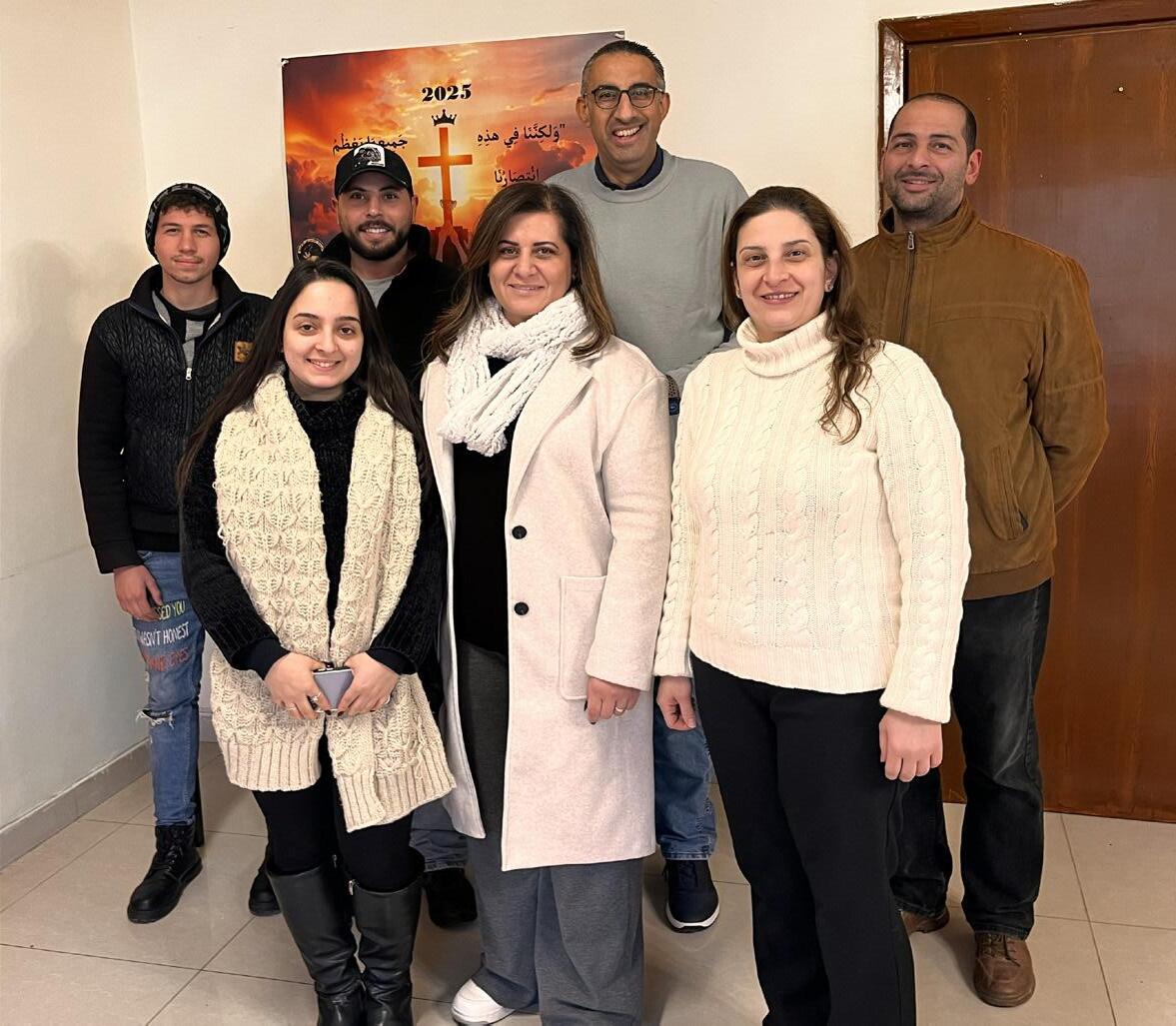
staff members: Marian, Lina, Ghassan, and Omar. Most importantly, the center offers a safe space for those who might never otherwise step into a church building. As needs arise and friendships are formed, prayers are offered, and the center becomes a place where the love of God is made tangible.
Adel* and his brother Rami* arrived in the Gardens area from northern Iraq about four years ago. After connecting with the church, they approached Pastor Zaki with an offer to give back. "What skills do you have?" Pastor Zaki asked. And just like that, in partnership with Nazarene Compassionate Ministries, when Adel and Rami replied that they
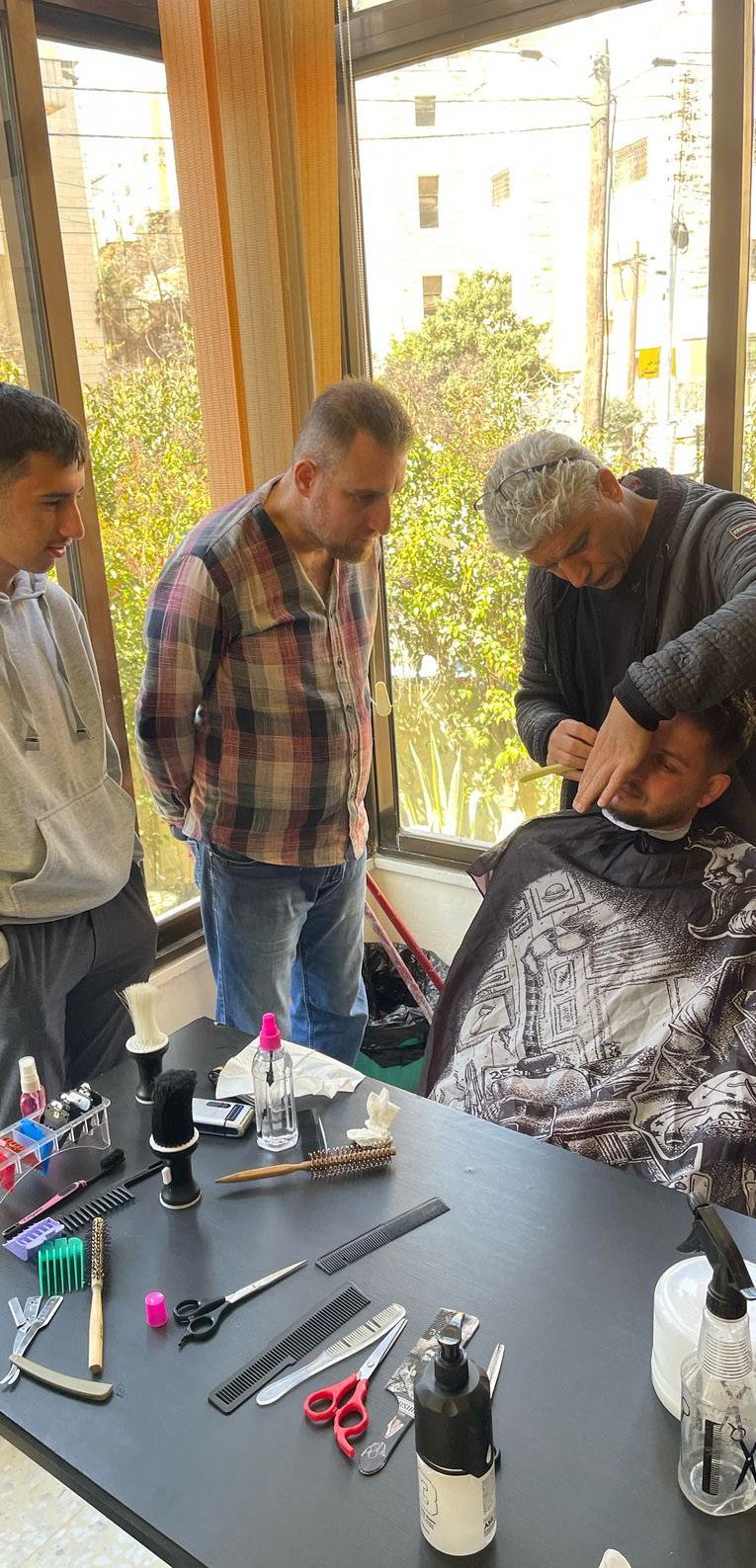
were skilled barbers, a new barbershop was born at the church’s community center.
Every week, Adel and Rami open their shop and offer free haircuts to more than 20 people from various nationalities and faith backgrounds.
"Haircuts can be expensive for refugees, so getting one for free is a big blessing," says Pastor Zaki.
In addition to providing a much-needed service, Adel and Rami have begun training others in the art of barbering. Trainers from Egypt, Syria, and Sudan have been brought in to teach the craft, which boosts the self-confidence of the trainees. These skills will help the refugees secure employment once they resettle, giving them an invaluable asset to rebuild their lives.
"Two years ago, Pastor Zaki invited us to provide this service, and so many people have benefited,” said Adel. “We are so honored to offer this service and give back. We receive so much goodness by helping others. We have gotten closer to the Lord and learned much more through our discipleship Bible studies. It is wonderful to be empowered to serve."
What began as a simple act of welcoming people into a church building—people forced to flee from everything they knew, experiencing a new city for the first time—has grown into a full-fledged ministry that serves not just the spiritual needs of those displaced by war but also addresses their practical needs.

The Gardens Church of the Nazarene community center stands as a beacon of hope for the refugee families who have lost so much. Through the love, grace, and service offered by Pastor Zaki, Fadia, and the rest of the team, they are not just offering a temporary refuge; they are helping to rebuild lives—one haircut, one lesson, and one act of service at a time.
*Names have been changed for safety.
You hear the cries of the oppressed, bind up the brokenhearted, and set captives free. We bring before you the people of the Democratic Republic of Congo, Ukraine, Sudan, the Middle East, Myanmar, and all places where conflict has stolen peace, where fear overshadows daily life, and where the most vulnerable endure the greatest suffering.
We pray for children and families who have known gunfire more than laughter, who have lost homes, family members, or the chance to live, work, and play without fear. Surround them with safety. Provide food, shelter, education, and the assurance of your deep love. Shape your Church to be the people and places where the most vulnerable are welcomed, protected, and empowered. Make our faith alive in love that acts. Stir your people to respond—not with words alone, but with hands ready to serve, resources ready to give, and voices ready to speak for justice. Let the Church be a light in the darkness, proclaiming Christ as Lord through steadfast compassion for neighbors and enemies alike. Where hatred has taken root, plant seeds of reconciliation. Where violence has shattered communities, raise up peacemakers. Where despair has settled in, renew hope through your Spirit. Strengthen all who carry heavy burdens for the displaced, the hungry, the wounded, and the grieving.
We look forward to the day when swords are beaten into plowshares, when children and families flourish in the safety of their communities, and when your peace covers the earth. Until then, make us faithful to love you with all our hearts and work for what is right in the world.
In the name of Jesus Christ, our peace,





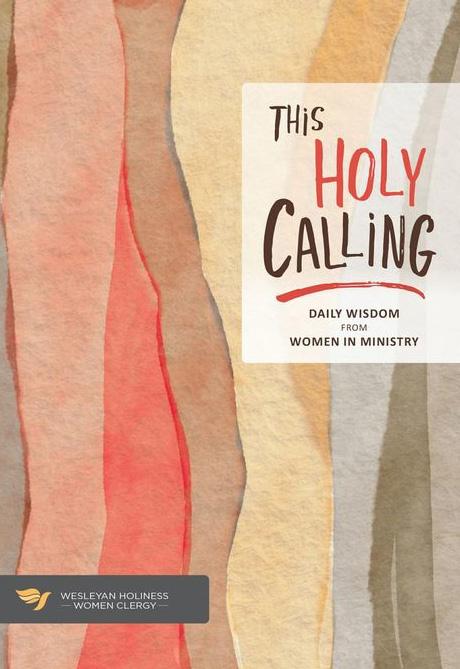
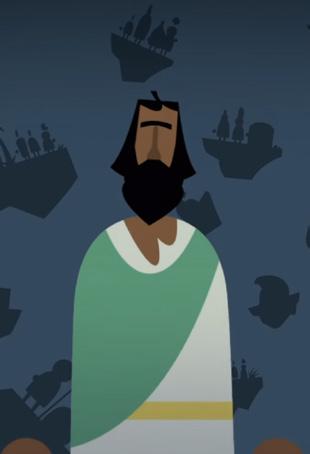
JOURNEY TO THE COMMON GOOD
by Walter Brueggemann
Journey to the Common Good by Walter Brueggemann explores how biblical stories— especially those of Exodus, Jeremiah, and Isaiah—invite God’s people to move from systems of scarcity and self-interest toward communities shaped by generosity, justice, and compassion.
THIS HOLY CALLING: DAILY WISDOM FROM WOMEN IN MINISTRY
This Holy Calling: Daily Wisdom from Women in Ministry is a devotional collection that brings together reflections, prayers, and insights from women serving in a variety of ministerial contexts. Each daily entry offers encouragement, wisdom, and inspiration, helping readers draw strength from the lived experiences of women faithfully following God’s call.
CHARACTER OF GOD WORD STUDIES BY THE BIBLE PROJECT
This series delves into Exodus 34:6–7, exploring what it means for God to be compassionate, gracious, slow to anger, faithful, and overflowing with loyal love. Watch it here: www.bibleproject.com
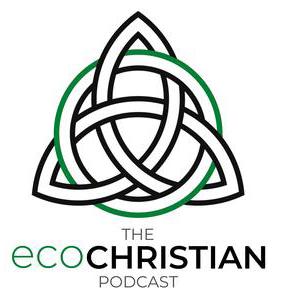
“BEAUTY AS DISORDER,” THE ECOCHRISTIAN PODCAST WITH DEIRDRE BROWER-LATZ
Deirdre Brower-Latz and Caleb Haynes reflect on creation care, showing how beauty and disorder invite us to honor God’s design. Drawing from farming and ministry, Brower-Latz explores stewardship, shalom, and life with creation.
Available on Apple podcasts
SCAN HERE TO WATCH NOW
SCAN HERE TO LISTEN NOW
Compassion constitutes a radical form of criticism, for it announces that the HURT IS TO BE TAKEN SERIOUSLY, that the HURT IS NOT TO BE ACCEPTED as normal and natural but is an abnormal & unacceptable condition for humanness.


–– From The Prophetic Imagination by
Walter Brueggemann


. . . the work of reconciliation cannot be limited to occasional intervention during conflicts but is about the patterns of everyday life. Reconciliation seeks to endow the practices of ordinary life with a flourishing that more closely reflects God’s plan to reconcile all things in Christ. Of course, the particular forms that the struggle for human flourishing takes varies depending on the history and needs of a place. To discern these things, we have to be there.
All we are really saying is that incarnation grounds the ministry of reconciliation in such a way that we learn to read the history, geography and needs of a place. As we do this in the context of God’s story, our imaginations are shaped to see what the embodiment of God’s promises could look like in our own neighborhoods. Without the story of God pointing to incarnation as both a model and a pattern of Christian living, we can never develop the patience or the skills necessary for the long haul of the Christian journey of reconciliation.
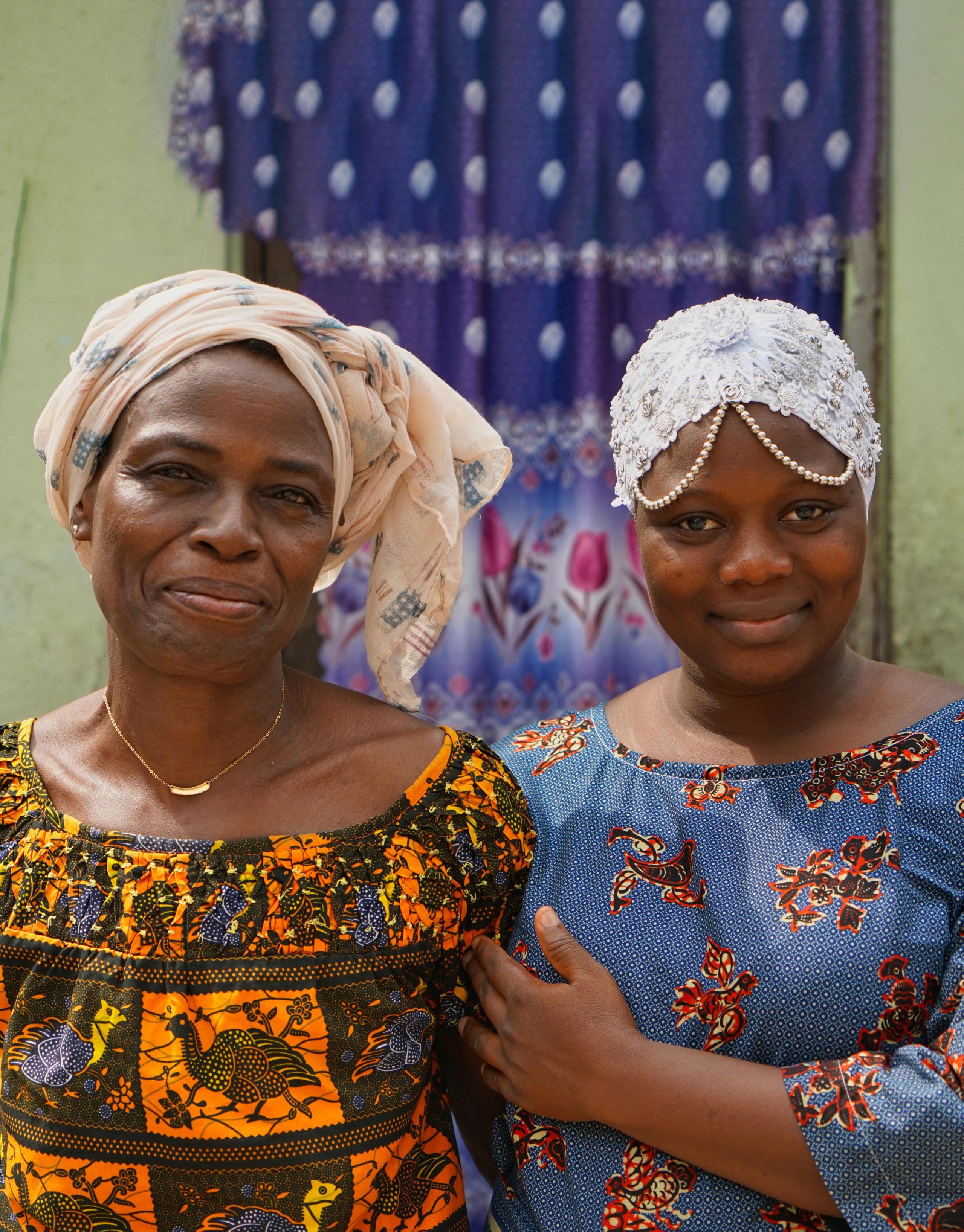
Church of the Nazarene 17001 Prairie Star Pkwy Lenexa, KS 66220
(800) 310-6362 info@ncm.org
